#i love going into depth over minor dr characters as well as major ones
Explore tagged Tumblr posts
Note
Do you think Spamton would have a personal problem with the existence of werewires and werewerewires? Considering that they're all actually Plugboys who are being controlled by wires/strings against their will, I was thinking that he might
Love your fics btw!! A relatively small number of Deltarune fics actually have Darkners using their magic regularly (or at all) and it's really cool to see in yours
honestly, spamton is the sort of guy who id imagine is so uber-focused on his schemes and neo, he doesn't care much for what unenlightened darkners are going through, and if anything he'd find some cruel, ironic humor in it considering the werewires are being controlled by queen, who's another darkner. Having a greater understanding of what's truly going on, the werewires' control is small potatoes to him, which is why he doesn't care about having them being additional victims of noelle's freeze sweep in snowgrave so he can take over the mansion.
yet i could also see it as unnerving him too, as his encounter with Kris immediately has him talking about his [[Silly Strings]], but what they have in common that the werewires dont is that they're both controlled by a higher power outside of the dark world, beyond their influence. Because he is unnerved, perhaps he's extra cautious of avoiding the werewires over other cyber city darkners.
Also, some werewires don't mind being controlled in the gameplay and they're totally chill with it, going about their lives when Queen isn't controlling them in the moment, so I can imagine a funny scenario of Spamton tryna get some help from some plugboys/werewires to get into the mansion in exchange for his help cutting their ties to Queen, but he's rlly shady about it and the answer he gets is a hard No. Like, they may be peons of Queen, but they trust her more than some smelly unhinged salesman who scared them half to death by leaping out of some manhole in the ground.
also tysm!! that means a lot :D! their magic was the highlight of their characters for me (particularly spamton's) because it's all just so goofy and cool at the same time. I love writing it so i'm glad hearing ppl like it!
#asks#srry i got carried away with this ask#i love going into depth over minor dr characters as well as major ones#and the werewires' designs are so so so cool#like my first playthrough when i considered spamton as just Some Guy and i didn't care much for him#the werewires were my favorite to fight#only toby fox could reimagine outlets as like werewolves when something gets plugged into them#it's so darn creative
17 notes
·
View notes
Text
Veilguard Thoughts
I just need to get my thoughts out of my head and the Void seems like a perfect place since I can’t write a review on console. I’m all for civil discussion, but at the end of the day this is my opinion/feelings after 20 hours. Perhaps it'll change once I finished the game, but I doubt it. Beware minor spoilers.
Warning: Incredibly long. TL;DR at the very end.
I’ll start this off by saying it’s not a bad GAME, just a bad DRAGON AGE. It runs nice (only had one crash, and minimal amount of stuttering on fidelity mode, one time the screen went completely black but the dialogue and music continued which was vaguely terrifying. Some movements are janky in cutscenes, but overall, not bad). It's pretty, I like some of the new designs. The music is nice.
I’m not a fan of this style of combat (never could jive with God of War or Bloodbourne; my preference for real time action is like Hades and DMC) mostly because I can’t cancel an action with dodge/block and the AI focuses solely on Rook so you end up getting swarmed and unable to properly see the flasher plus the timing is weird af. I tried playing on what I assume was supposed to be Casual mode (Keeper) because it said “emphasizes party composition over reflexes” and well…it lied. To the point that I was not having fun because the game is 70% combat, 20% exploring and 10% story. So I turned it to Story mode because I could not be bothered and enjoyed it slightly more. It feels very MMO, team-based, looter imo. The UI, how it handles, the depth of the story and how it goes about it (the Mission Accomplished Journal screens specifically), the emphasis on combat over anything else…
And here we get to my problem: I only enjoy it when I pretend it’s just a generic fantasy game and not Dragon Age. Because it doesn’t FEEL like a Dragon Age. It feels as soft as everyone’s skin texture. I don’t care about the story or the characters and it boils down to the writing.
It feels juvenile.
Like I loved DA because it was willing to confront the worst in humanity. The disgusting parts of war like Loghain selling elves to slavers, or the nunances of blood magic. Presenting choices that are morally grey like sacrificing the Circle or the Templars in DA2 (yes that choice was heavily forced and stupid but still). It didn’t shy away from it. There was levity, but the characters had multiple sides. They could get angry, they could get snappy or sappy. There was GROWTH to them. Zevran’s romance arc if you choose to reject the earring without more commitment was beautiful. DA2’ romances were…a little stilted, but I still enjoyed them. Inquisition also had lovely little arcs, depending on the romance. But even friendships felt natural as you got to know these people.
And Veilguard falls flat. They were okay with pissing off the culture war babies with trans/nonbinary options, but not with showing us the bad things. The game TELLS us “this is bad”, but doesn’t show why. They have their soap box moment of “slavery bad” like it’s not 2024 and anyone worth the air they breathe knows that, how about you still show that since we are IN THE HEART OF THE SLAVE TRADE?! Where’s the option to maybe be an escaped slave? An escaped Saarebas? They refuse to give us blood magic because “it’s messy” Yeah. It is. That’s the point. Maybe let me decide if that's a line I'd like to cross? No? Necromancy is fine? It’s like we traded the dark adult themes for better sex scenes.
The major choice I’ve gotten to means NOTHING outside of metagaming. It’s like they were trying to show they could be edgy or that “now now you can’t save everyone because we say so and we are going to force one of your companions to hate you”. And it boils down to who you want to romance, who is vital as a support character, and which faction do you prefer? Has nothing to do with anything else and there’s no way to fix this forced hardening, so have fun with that I guess? It’s not like I chose the dialogue options or anything, it feels as shoe horned in as DA2’s ending tbh. Like here have a shitty decision for no other reason than we want you to.
Then BioWare seems to have tried to both cater to the newbies and the ones who read/watch/listen to the extra media and fail to find a middle ground. It relies too heavily on codexes and journals and other media (which was my gripe with Inquisition) to do the heavy lore lifting (for example as someone who did not read Tevinter Nights yet nor listened to the third-party podcast, I have no connection to Rook's backstory).
But at the same time, it treats us like we are stupid? Going back to how juvenile the writing feels: it repeats itself a horrific amount. Every time Solas says “the Evanuris” it’s apparently a contractual obligation for him to say “or the elven gods as you would call them” immediately after. The amount of freaking out about them CONSTANTLY is like they are afraid we forgot after an hour. And again I kept thinking: how about you stop telling me they are terrible and why I should be scared and SHOW me? D’Meta did nothing because I didn’t see it happen like watching Loghain call the retreat after watching darkspawn slaughter the army. Another example in the beginning is after you get the dagger, you speak with Harding and you can discuss magic. Rook notes they know dwarves are called Children of the Stone. Five seconds later Harding goes in the most “I’m speaking to a toddler” tone: “Dwarves call ourselves Children of the Stone. Some of us have what we call Stone sense.” Like…Rook would know that??? If newbies are confused they can go look in the glossary (isn’t that what that’s for?) or give an option to ask a question. It just feels so fucking patronizing.
Then it spoils so much of the story with the Varric interludes, or repeats itself AGAIN when I think they are there for style and suspense. Like Varric I already know they need to craft a red lyrium dagger, they straight up TOLD ME. That scene didn’t need to be in there at all. Solas’ little monologue rehashing everything in the beginning was unnecessary, and honestly him just telling us who we were against without us first seeing how bad it was…just…It took the suspense out of it. Like imagine if Inquisition straight up told you that Corypheus was the baddie just immediately in the Temple of Sacred Ashes prologue scene. That’s what it felt like.
Which brings me to the dialogue and characters I suppose. The companions have the depth of a shallow pool and Rook has less. They have moments where I like them, but tbh I don’t really care for any of them because how could I? I can’t talk to them. It feels empty. I like that they have lights telling me when I have new dialogue, but I miss having conversations with Dorian or Zevran, getting to know them before I started flirting with them. But nope. None of that. And good god the flirting is cringey because of it. Just comes out of nowhere and feels like teenagers. Again, there are moments where I’m like: THAT DO THAT, but it goes right back to the blah stuff. Like whoever wrote the Crows, good job. I loved Teia almost immediately. Viago great. Illario, I’m intrigued. Lucanis by default also interests me, but unfortunately, I don’t get to explore his character much. Irelin is also good. I liked the Veil Jumper fight you could get into with Strife (felt like witnessing a father/child yelling match). Where’s that sort of dialogue with everyone else?
And ROOK. Oh god Rook. They make a big deal about us not being able to be a people pleaser, and yet that’s the only personality Rook has. My favorite moment of Inquisition was in Trespasser where the Inquisitor could FINALLY have a human moment and BREAK. It felt like they had been bottling it up for so long and they just couldn’t anymore. I don't foresee Rook getting that sort of moment.
Rook is just three flavors of customer service. There’s no option for them to be anything but the dashing hero who has boundless optimism like a puppy. Where’s the option be the reluctant hero? The ruthless “hero”? They are just a bumbling idiot with witty one liners.
They feel like a teenager’s first protag as they try to give them “flaws” but never show those flaws. Nothing you do matters, just how you say “yes I’ll help”. There’s no nuance. No places where I think Rook can grow without ME. Rook is just a blank doll without me projecting onto them and even in BIG supposedly heartwrenching moments, Rook is just an idiot. And put them with the juvenile and forced dialogue of the companions? It feels like they are a pre-teen who’s been put in charge of a bunch of toddlers while the nice uncle tries to soothe them and the abusive dad yells.
The abusive dad is Solas btw. Varric says he views us all as children, to which I want to reply: yeah and he’s a piece of shit dad who rubs their toddler’s face into their diaper going “LOOK AT THE MESS YOU MADE BAD BAD BAD!” Like honestly, you can tell it’s not the same people writing these characters. Solas feels like they decided the low approval Solas was the canon no matter what. In Inquisition I truly felt like he was redeemable. This Solas? Nah, I want to stab that bitch first chance. Like he’s giving me no reason to like him and he’s being a dick for no fucking reason. Maybe later on we learn a reason, but in 20 hours there’s ZERO. That’s a problem if you are trying to get me to see his side of things. And the tonal shifts from when he shows that he regrets stabbing Varric? Feel forced, like my dude I think you are lying just because you seem to be unable to comprehend half of this is YOUR fault.
Which ties into my last gripe: this is not MY Thedas. The decision to make only the last fifteen minutes of a paid DLC mean ANYTHING (and tbh I have yet to find where the hell it actually matters in 20 hours. I have two saves about the same amount of progress: one Solavellan and the other Dorian, they are basically the exact opposite choices. I can't say I've found where anything has changed, so what was that about them not wanting to do one bit of dialogue???? At least in Inquisition within the first two hours I could find those bits of dialogue) that decision made it where none of these characters matter to me. They feel more like carrots dangling in front of long-time players trying to entice us closer, but when you grab the carrot…it just vanishes.
That’s not MY Morrigan. That’s not MY Varric, MY Solas, MY Dorian. They are NewBioWare’s versions of them. The Inquisitor? The character I played over 100 hours as isn’t MINE. They are a stranger because they tore away any agency I had. They just picked whatever personality they wanted and said LOOK SEE CONNECTION. But there’s no history, no connection, NOTHING. There’s so many places where I can see where they could’ve done something. And if I can see them, why couldn’t anyone at BioWare?
They forgot that DA’s uniqueness wasn’t just the companions (and these ones are just below DA2’s since we didn’t get to interact with them either, so…), it was the world and how it reacted to choices in previous games. How new heroes might have to deal with the consequences (and to be fair, no DA game has ever actually managed to deliver on that, but they at least TRIED).
This though…
TL;DR: this should’ve felt like a homecoming and instead it feels like BioWare demolished my home, spray painted the ruins with soft pastels and is trying to tell me it’s the same, if not better. And it’s not, and probably never will be again.
#pay no attention to the bird behind the curtain#talking to the void#bioware#the veilguard#dragon age 4#minor spoilers#But don't spoil late game things#I just needed to get the thoughts out of my head#Because I'm just feeling hollow#I get that it wouldn't be the same#but this hurts on a different level#It just feels so empty and soft#I'm only playing now to see how exactly this mess of a protag manages#and also to hopefully get an option to stab/punch Solas at this point#I didn't even mention how silly and goofy the new darkspawn are#Regardless of if there's a lore reason#they aren't terrifying or revolting they are silly and honestly look like the assets weren't finished/or were bugged#Like DAI's Ogre was terrifying#The Shrieks' noises still trigger a shiver in my head#And why do their buttcracks and groins glow???? Was that necessary? Really?
16 notes
·
View notes
Note
Curious to hear what your stance on veilguard is. Heard mixed things but given its modern bioware I half expected it.
Alright, given I just finished my first playthrough:
It's fine enough. I'll take you through my likes and dislikes under the cut, but here's the TL;DR.
Veilguard is a fun action game that I enjoyed playing. I do have significant problems with roleplay, story, character interaction, pacing, and exploration, but for what Veilguard is, I enjoyed it. I can't in good conscience call it a fantastic game or claim Bioware is "back" or whatever, but I enjoyed myself with it, and I had a lot of fun. I'd say the rating would be between fine and good. I'll call it a 6/10.
So, a more in depth review: We'll start with what I liked, then go over my critiques from minor to major. Honest critique, all my opinion. Spoiler warning for the whole game below.
If you disagree with my thoughts, that's fine! I'm glad you found something to like about what I didn't, and you're valid if you didn't like what I did. Just giving my opinion.
So. I really liked the combat! I played a mage and I found each combat really fun and engaging - I kept testing out the terrain and developing my skills to focus on the staff - I basically never used orb and dagger because I kept misjudging the reach. So i loved getting to shoot tons of magic missiles and I used the bonuses that got me extra projectiles. The terrain was great for combat because I always felt like I had options, so even when combat would start to get repetitive, the different tactics I could use really saved the day. I will say the enemies seemed particularly overtuned to attacking me over my allies, but I'll forgive that as companions seem mostly there to do detonations anyway, and they don't seem to be able to fall in battle. I like that Rook's abilities have enough variety that even when I pulled a two-mage party (me/Emmrich/Davrin) I still had options for detonations.
I really liked the voice acting. Davrin's actor seemed overly stilted at first, his voice in too deep a register that felt forced and unnatural, but he really hit his stride, especially in softer moments. Bellara's actor was INCREDIBLE, and Neve's had just the right amount of emotion to portray a stoic character with such subtlety. Asher and Teia were standouts for me for side characters. Will point out that the voicing clearly got done during the pandemic because at several points the characters sound really nasally and congested. Luckily for me it happened all in a cluster so I could headcanon there was a nasty cold going around the Lighthouse.
I did like the characters. Neve was far and away my favorite, for her humor, her standout questline, acting, and the friendship between her and my Rook - it felt the most fleshed out and well-written of them all. Davrin and Emmrich I liked a lot too. Emmrich is fun and unique. Davrin I really loved, but I hated that his arc was completely about Assan and the griffons, even his epilogue slide. I know pretty much what all the companions are gonna be up to, and what the griffons will do - no frickin clue about Davrin. I didn't get very much Lucanis because I saved Minrathous, but he was great in banter and I loved his and Neve's romance. Bellara's voice acting was wonderful, but I didn't connect with her as much because I felt she got hit with the Joss Whedon beam (character most likely to say "Well, that happened" or "he's right behind me, isn't he?"). Great acting, not so great writing, and while Taash was okay, their personality wasn't one I really click with, and by the third time their dialogue was "noncomittal grunt" I had checked out. I really hate their questline decision of "Rivain or Qunari heritage," especially as a multicultural person myself. It's just such a nonbinary issue, ironically enough. I never had an attachment to Harding, and Veilguard didn't really do anything to make me care about her, so more on that later. Also, I didn't feel like her questline decision DID anything. I chose anger, and she wasn't really more angry or outspoken or anything.
Now, onto the criticism.
The sound design wasn't it for me. The music is pretty forgettable - I barely even remember the main theme, even though it got played three times at the end. I liked the Nevarran area music because it really felt cool and gothic and unique. I hated the Rivain area battle music because I think I heard like, electric guitars? The sound effects felt more sci-fi than fantasy to me. I kept feeling like it read more "blaster pew pews" than "magic blasts".
I didn't really enjoy exploration. It got kinda tedious after awhile, especially since I started to get upgrades for items I never used or needed and couldn't get rid of. There weren't a whole lot of great puzzles in the game. The only one I can think of is the Sharksmouth puzzle with the four Warden statues. Other than that, it's a tedious scavenger hunt, and generally comes down to finding the power source like, two feet away from the switch.
The story has a very slow start. Up until the Minrathous/Treviso choice, the game feels kinda aimless and rough, but after it, it starts to focus up a little more and feel more like you have a goal in mind and stakes for it. That said, it feels like Minrathous v. Treviso is the only choice in the game that has actual and meaningful consequences in the world. The choices besides that were disappointing. I never really felt like I was making very much of a difference in the story. Dialogue choices never felt like much of anything, to be honest, and I never really felt my relationships with the companions evolving, especially because I couldn't discuss much with them whenever I was at the Lighthouse and they didn't have a quest for me. Banter was all well and good, but when it came down to it, it disincentivized exploring the Lighthouse because I knew I wouldn't have any conversations waiting for me.
Minrathous v Treviso being the game's only big choice felt so disappointing because it was that moment, with a whole city being Blighted that I felt "here's where it gets going! My actions having major consequences!" I wish it had kept that momentum going. In theory, the endgame should have been the coolest thing - it was clearly a redux of the ME2 suicide mission, where you have to show you were paying attention the whole time, picking the right person for the job, with lives on the line... except the game was so handholdy about it. "THIS MISSION WILL WORK BEST WITH A SKILLED ASSASSIN." Yeah, no shit. And the way the narrative comes to a grinding halt more than once to remind the player in no uncertain terms to do the companion quests felt really poorly done.
The game's most major misstep, for me, was the decision to tie companion relationship to their level. By doing so, it made it impossible to have any other relationship with each companion because the game doesn't want them to be under/over leveled. You can't be really friendly because the game can't have overleveled companions. You can't be unfriendly because the game can't have underleveled companions. The romance lines were well-written, but the companions kinda felt like they were always wherever they needed to be at for the story - the lack of conversations means you don't have often to flirt or build up a sense of the characters liking each other. Davrin and Neve are the most well-written here because Davrin's flirt lines are great, but he's also written well as a friend. You can clearly see the relationship evolving. Neve too, she always felt like she was warming up to my Rook every time. But Emmrich, I don't really see what he likes my Rook for other than because I decided to initiate the romance. And I really liked Emmrich!
But the worst part of the game was all the nods they tried to put to Inquisition (because any nods to DAO or DA2 were few and far between). I barely cared about Harding in Inquisition and now she's acting like she was in the Inner Circle. And the idea that only three choices from Inquisition matter was awful. I think it was absolutely an awful move to make your epic closer/sendoff to your story a soft reboot. Not saying that they had to make Inky the protagonist or anything, but to have next to no choices matter and then nuke the South offscreen felt so disrespectful to the whole story. Also it feels like there's no difference for whether your Inquisitor who didn't romance Solas vows to stop him or save him.
As an action game with some choice and great companions, it was pretty good. But as a Bioware RPG and the conclusion to three other games where choices mattered - especially interwoven choices from previous games, I'd call it highly disappointing.
Still, I found lots to like about the game. Its combat is fun and engaging, its characters are easy to love, and it looks fantastic. I wouldn't call it a bad game by any stretch. But it does have flaws, and those flaws can be dealbreakers for fans of the series and I completely understand that. It was a disappointment for what I was hoping for, even if I liked it in general. I don't know if I'll be back for the next game when/if it comes out. If you can enjoy it for what it is, Veilguard can be a great experience. But, as always, the only way to truly determine is to find out for yourself.
Or you can ask me more!
Thanks for reading.
2 notes
·
View notes
Text
The Owl House and pacing, a perspective from a fanfic writer that works with a large cast
I’ve seen a bunch of complains about the way The Owl House is paced lately. People claiming that it’s bad writing, and rushed, and whatnot. But from how I see it, you’re complaining for all the wrong reasons, and to the wrong people.
TL;DR: this is an overlaying issue with Disney and the industry that doesn’t allow long shows anymore, essentially forcing writers to pick between good pacing and complex stories being told with large casts.
For context: the fandom I wrote for before I got into The Owl House had a pretty small main cast. There were a few reoccurring characters, but most of them only showed up like five total times over the course of four seasons or had little personality, so my main cast I was writing about always consisted of my main five characters, with occasional cameos here and there. All characters were living together and experienced the adventure from the same perspective. There was one overarching storyline and not multiple. The interpersonal relationships still varied, though, for obvious reasons.
Now think about how large The Owl House cast is, and why that’d send them running into issues. Or don’t, because I have a whole-ass in depth analysis under the cut because this got unreasonably long.
(Also I’d appreciate a reblog, I spent… an unreasonable amount of time on this, lol)
The Owl House is different. There’s the main characters: Luz, Eda, King, maybe Hooty, technically (someone recently pointed out that he’s technically the titular character of the show and I’m still processing that, lol).
But they also have a HUGE additional cast to work with. There’s Lilith, Eda’s sister, and the main antagonist of season one, who has a lot to her character and gets a ton of screen time. There’s Amity, and there’s Willow and Gus, Luz’s friends. They’re all very fleshed out characters, and got a bunch of screen time and development, despite “only” being reoccurring characters and not the main characters.
Then there’s characters that have played a fairly minor role so far. There’s Belos, the big bad villain, who we will likely learn a lot more about this season. There’s the Golden Guard, the new main antagonist our cast deals with personally, who we’re just starting to learn more about. There’s Camila, Luz’s mom, who, despite only showing up a couple of times in the show so far, is very relevant to Luz and how the plot will ultimately turn out. There’s Edric and Emira, Amity’s siblings, who despite only showing up a few times as well seem to have a very worked out personality and background and also have a story that is (at least to some extent) going to be told according to the AMA.
There is at least one more seemingly important character whose role in the bigger story is hard to tell at this point, Raine, but according to the description of the episode, they’re probably going to influence the story a bunch.
There’s Alador and Odalia, who are responsible for a lot of their children’s toxic behaviors, and seem to have bigger plans that will probably be relevant later on.
The characters that are only focused on for an episode or two (like Matt and the troublemaker kids) all have very worked out personalities and even short arcs.
And heck, even characters like Boscha, who is extremely minor and seems like a very one-dimensional bully for the most part, get their moments that hint at there being more to them. We know Boscha has a clingy mom, that apparently has a rivalry with Odalia and works with Amity’s parents. The scene at the beginning of Wing It Like Witches tells us a lot about her general mindset and how she’s embraced that winning at whatever cost is the only thing that matters.
This leaves us with: 3-4 main characters
3 friends with fleshed out stories
Lilith, who is probably the most relevant aside from the main cast
Belos, the main antagonist, and the Golden Guard, currently starting to become a lot more relevant
A whole handful of minor reoccurring characters that have the potential to become bigger characters at any point in time
A handful of minor reoccurring characters that mainly seem to be there to further the story, but still get to have distinctive personalities and motivations (looking p.e. at the troublemaker kids)
That is AT LEAST 9 pretty major, relevant characters whose stories have to be tackled in the same show, in addition to the people that joined in season two and a huge supporting cast of well-developed characters that clearly also have stories of their own, even if not all of them will get told.
On top of that, the Owl House lives from exploring different relationships and different storylines. There’s the overarching story of how flawed the system is that will likely end with them overthrowing Belos, but there’s so much more.
Eda and the curse. Eda becoming a better mentor for Luz. Eda coming to terms with the loss of her magic.
Luz learning to cast magic with glyphs. Making friends for the first time. Slowly falling in love with Amity. Fighting to be able to learn whatever kind of magic she wants to. Learning that she’s not a burden to people. Struggling with her relationship with her mom, and trying to restore the portal so she can get back to her. Figuring out her future and what she really wants.
Lilith trying to cure Eda, and now in season two coming to terms with the loss of her magic and fixing her relationship with her sister. Lilith learning to ask for help.
Willow switching tracks. Willow growing more confident.
Amity becoming a better person, fixing her relationship with Willow, standing up to her parents, falling in love with Luz. Starting to fix her relationship with her siblings.
King finding out where he came from.
Hints at Gus struggling with decision making and stressing himself out less. Gus learning to be more selfless. Struggling with his magic track and being the youngest in his grade.
The newly introduced plot point with the Golden Guard. The plot point about the rebellion that will get introduced next episode.
The mystery with the letters.
And I’m like 90% sure I’ve forgotten something.
That is… a lot of different plots and relationships that are in some way important to the story.
In comparison, as stated, the last show I wrote for focused mostly on the same five characters and their relationships with each other, and one overarching plotline aside from some minor interpersonal relationships with two people’s family members that weren’t even introduced for several seasons. The first season fully focused on establishing the bond within this found family with exactly 1 important reoccurring character, an antagonist that had little personality and got a total of one line of backstory before he died.
If you have 90% of a season to develop 5 characters who live together, that’s a lot easier to do than developing twice the amount of important characters + introducing reoccurring characters season one of The Owl House has—the majority of which have separate lives and do not live together and thus can’t be focused on at the same time.
I’ve seen a bunch of people complain recently that the pacing of The Owl House is off, that the writing is bad, that the show is rushed, etc. etc.
And I get those complains. Believe me, as a viewer and also as an author that takes a lot of time to develop each character and their issues individually, I 100% get it.
But as an author that’s currently learning how hard it is to tackle a cast of the size that The Owl House has, I’ve also come to a whole different understanding from the perspective of the writers on the show.
For context, Locked Out focuses on a couple of serious themes, in the same way that the show does. It has 4 main plotlines: Amity Camila and Luz, Edric and Emira, Eda and Lilith, Willow and the Grudgby Squad (as well as a Gus arc that ties into the last one while also being its own thing, we’re getting to that part). So far, it prominently features: Luz, Amity, Camila, Eda, Emira, Edric, Willow and Gus, and to a lesser extent King, Lilith and Boscha, Skara and Amelia in relation to the separate plots.
That’s eight main characters across five different households. And then there’s the reoccurring characters that will have a larger role later on that I’ve not even had the opportunity to bring into the story yet/feature in a more prominent way. The cast is still growing.
And heck, I have all the time in the world to write this thing, because I don’t have an episode limit, or a deadline, or a limited amount of money to produce it.
For Locked Out, it took me 120k to get through a single week of plot at a very high level of character development, with about as many important characters as TOH has in season 1, and with an equally high number of reoccurring characters, some minor, some major. I think you can compare it to the show pretty well. I’d say, if I were to split Locked Out into episodes, I’d set one episode at about 10k. That would be 12 episodes. 12 episodes to get through a single week. Heck, even if I said 20k words were to be one episode, which I’m pretty sure is too much realistically, that would still be 6 episodes for one week.
And TOH covers more than three months.
That would be at least 72 total episodes to get through the three months of summer camp. And we’re currently progressing past that point.
72 episodes.
Let that sit for a while o.o
Everything that’s happened in season one (which as we know now was about 2 months) would have happened in 48 episodes rather than 19. Pacing-wise, everything would happen at less than 0.5x the speed. The first four episodes of season two would’ve been 24 episodes, assuming we hadn’t skipped a week and a half and had instead shown the immediate aftermath of the petrification ceremony, too.
And I’d love if we could have that, and if we could actually develop the characters and their relationships that thoroughly.
But the sad fact is that shows like The Owl House do not get the amount of episodes that would be required to develop every single aspect of the show to its fullest potential. Disney rarely greenlits shows of 150 episodes anymore. They used to, once, (Phineas&Ferb for example had 130+ episodes—you could tell one hell of a story in that many episodes), but that’s not a thing anymore. And the writers know that going into a show. They know the chances their story will be told in that way are very low.
And thus, the writers, especially ones working with large casts, have to make a choice: cut characters they love, and plots that are important to them, because they know they won’t get the amount of episodes required to do everything perfectly, OR include most of what they want to do, but at the cost of the pacing being off and everything seemingly happening too fast.
The Owl House crew went with the second option. The biggest issue the show has isn’t bad writing. The show’s biggest issue is that its cast and the story the crew members want to tell are too big for the amount of episodes they’ve been given (especially now that Disney decided to cut season 3 down into just three 44 minute specials).
And that’s on Disney, and Disney alone.
The crew is making the most of the amount of episodes they have, and unfortunately the lack of time forces them to rush things, and to sometimes sideline characters to focus on others.
Lilith got a bunch of screen time in the first four episodes. I’m sad to see her go, but she’s basically guaranteed to be back by season 2B. And there’s other people that have gotten way less focus than her so far. We‘ve seen basically nothing of Willow and Gus for the first few episodes, and I’m super happy Gus finally got some focus! We haven’t been inside Hexside all season except to see Luz expelled! And episode seven is even going to introduce a new character. Sometimes there’s parts of the story that certain characters don’t have a place in. And it sucks if they’re characters you like. But Lilith has to go for a bit so other characters can get the same amount of spotlight she did. At the end of the day, Lilith is not part of the main cast. She’s a very important reoccurring character, yes, but so are Amity, Willow and Gus. The main characters are Eda, Luz and King, and they’re the only ones that will always be around. And heck, even Eda got sidelined for a bit in the last two episodes, because we needed to focus on other characters. If not even the main characters are always around because we need some spotlight time for other characters, you can’t expect any more minor reoccurring cast member to be.
God, I wish they’d be given more time and more episodes to bring every part of the plot to its full potential, but they don’t have those, so they sometimes have to take shortcuts that unfortunately cheapen the story here and there. It’s the only way they can hope to tell their story to the end at all. And that makes me hella sad because it’s so obvious that they have an incredible story to tell, and that there’s so much more to so many of the characters we just don’t have the time to focus on.
The thing is: I liked the episode with Gwendolyn. It sends an important message that will hopefully get some parents who watch with their children thinking, and I’ve seen a couple of people talk about how close to home it hit for them. I have also seen a couple of people complain about that being too fast—and also just in general about things in the show getting sorted out too fast. And I get it. At least with this particular episode, I 100% get it.
(I’ve also seen some people complain that “Amity stood up to her parents too fast in Escaping Expulsion”, but I vehemently disagree with that. We’ve been building towards that moment since season one, with her doing more and more things that were technically defying her parents. I don’t see how this was rushed.)
Just… please don’t blame the writers. Dana even said that Keeping Up A-Fearances is one of the episodes that hit very close to home for her in the recent stream iirc? So I highly doubt this was rushed on purpose, or because the whole thing is “bad writing” when the entire writing quality of the show says otherwise.
A lot of shows in general have the issue that they have to be written season by season rather than as a full story these days, because there’s always a chance that they won’t get a next season. How large scale the story they want to tell actually is doesn’t matter if there’s a solid chance they won’t get to do any of it.
From a viewer perspective, I get being frustrated at the pacing being off. But from a writer perspective, the chances are very high that this is a choice they had to make, rather than one they wanted to make. And I don’t think you can truly see this if you’ve never worked with a fleshed out cast that large—Locked Out was really eye-opening for me in that regard.
This isn’t simply a case of bad writing/bad pacing by choice. It’s forced. They’re forced to rush through their plots because otherwise they won’t get the chance to tell certain parts of the story at all. And the saddest thing about this is really that those 72+ episodes to flesh out these plot points further wouldn’t have been an impossible thing to get, at a time.
Go for Disney’s head. Yell at the industry for being what it is today, for constantly axing shows before even giving them a real chance. But this isn’t on the crew.
#reblogs encouraged#I’m praying this shows up on the tags but not getting my hopes up#the owl house#luz toh#amity toh#toh#luz noceda#amity blight#lumity#dana terrace#owl house#luz x amity#willow park#eda clawthorne#Gus porter#golden guard#king of demons#edalyn clawthorne#eda the owl lady#lilith clawthorne#writing#Disney#luz the human#luz the owl house#eda the owl house#king the owl house#Lilith the owl house#eleena rants#pacing#long post
243 notes
·
View notes
Photo
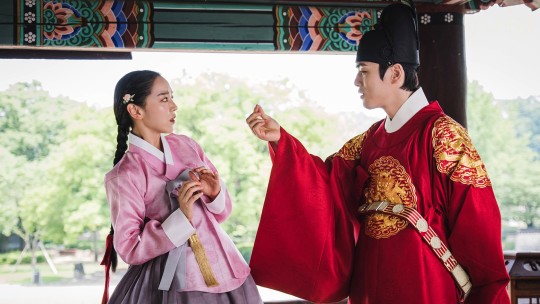
Week 1: Understanding Korean History
To say I was excited to join the first session of the KPA was an understatement - I had my notebook, coffee and highlighters at the ready like a nerdy highschooler on her first day at school (yes, I was that girl). After a round of introductions from fellow KPA-ers, we kicked off Week 1 with an in-depth lecture from Dr Anders Karlsson (Senior Lecturer in Korean at SOAS, University of London) who took us on a whistle-stop tour through Korea’s illustrious history.
I don’t know about you, but sometimes I find ancient history a bit…inaccessible (*ahem* boring). So I thought I’d combine this week’s homework of presenting a (very) brief outline of ancient Korean history with a passion of mine: K-dramas, specifically that of historical Korean dramas or sageuk (사극). Maybe it’s the sumptuous costumes, the swashbuckling sword fights and horse riding scenes, or just my overly-romantic notion of the past, but it’s a genre that I’ve consistently been drawn to.
Prehistoric Korean history Dr Karlsson mentioned that most records of Korea’s early history have been destroyed, making it difficult to pinpoint when exactly these early civilisations came to be. However, it has been noted that even all the way back in 2000 BC, rice cultivation was already well-established around the Korean peninsula. The Bronze Age came to the tribes in the area at around 700 BCE and then, around 300 BCE they moved into the Iron Age, as noted in Chinese records for the first time.

Dramas set in this era are extremely uncommon - and probably for good reason. In fact, the only one I know of is Arthdal Chronicles starring Song Joong-ki which turned out to be…a bit of a train wreck. It’s supposed to be a fantasy drama (think Korean ‘Game of Thrones’) that happens during the Bronze Age and is ‘loosely based’ on the creation story of Dangun, the son of a heavenly prince and a bear-woman. Legend has it he goes on to build and rule the kingdom of Gojoseon (‘old Joseon’) in 2333 BCE, but Dr Karlsson points out those timings don’t seem to add up with historical records.
Three Kingdoms Period (57 BC - 668 AD) Around this period, the Korean peninsula was mostly dominated by tribes but by 57 BC, the kingdom of Kingdom of Silla emerged, followed by the founding of Goguryeo in 37 BC by Jumong (there’s an old but much-loved drama by the same name) and finally with the founding of Baekje in 18 AD by Jumong’s wife and her sons. These three kingdoms were heavily influenced by Chinese civilisation, especially with the spread of Confucianist thought and Buddhism which arrived in the 4th century.
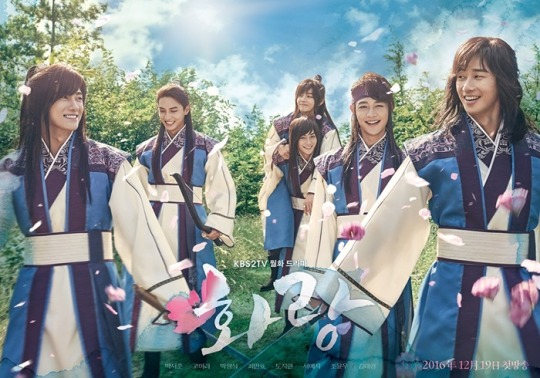
The only drama set in the Silla period that I’ve briefly dabbled in is Hwarang: The Poet Warrior Youth which stars an A-list cast (Park Seo-joon, Go A-ra and Park Hyung-sik) but I’m sure is simply an excuse to put a bunch of very pretty looking boys in warrior uniforms. (I mean, hwarang literally translates as ‘flowering knights’ so case in point.)
Goryeo (918 - 1392) We fast forward to the founding of Goryeo which brought about ‘true national unification’ through centralisation of power, bringing under it the aforementioned three kingdoms as well as the northern kingdom of Balhae. One of the most well-known dramas set at the beginning of this era is Moon Lovers: Scarlet Heart Ryeo (starring IU and Lee Jun-ki) which, thanks to its stellar acting but unsatisfactory ending is equal parts loved and hated among the drama watching community. (I just realised this is another drama with another all-star cast of very pretty men - are you spotting a pattern here? Haha!)
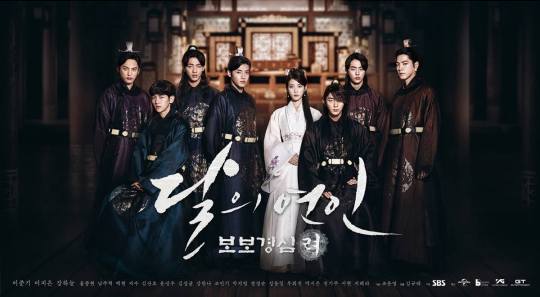
Joseon dynasty (1392 - 1910) The majority of sageuk that I know of are based somewhere within the 500-odd years of the Joseon dynasty. There is a wealth of material to work off - be it the kingdom’s relationship with the neighbouring Ming dynasty, various Japanese and Manchurian invasions, as well as Neo-Confucianism taking over as the new state ideology.
It was also a time of great progress - the Great King Sejong created hangul, the native Korean alphabet in 1443, as sweetly depicted in one of my favourite fusion sageuks, Splash Splash Love, starring cute-as-a-button Kim Seul-gi and idol actor Yoon Du-joon. It’s just a 2-episode mini drama, but manages to pack in so much cross-dressing and time travelling hijinks, as well as incredibly well-fleshed out characters.
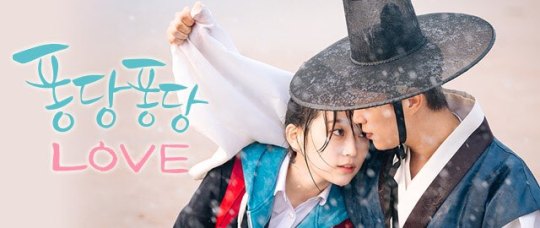
After fighting off a Japanese invasion (1592 - 1598) and Manchu invasions (in 1627 and 1636), late Joseon saw itself as a bastion of civilisation and successor to a waning Ming dynasty. However, the West soon came knocking at its doors. Another time-travel drama, the recently completed Mr Queen, is a gender-bending portrayal of the titular Queen Cheorin (1837 - 1878) set towards the end of the Joseon era. While this wacky but highly enjoyable drama is blatantly inaccurate historically, it references the Donghak movement, a Neo-Confucian philosophical ideology which came about in response to seohak (‘Western learning’) which arrived to Korean shores via Catholic missionaries.
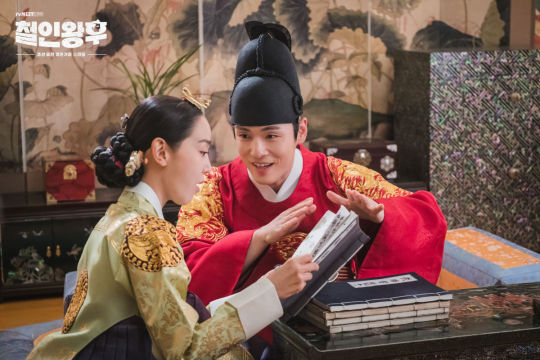
The influence of Western ideology on late Joseon is further explored in Rookie Historian Goo Hae-ryung through a minor story line involving a Jesuit priest who disseminates his medical knowledge of vaccinations to combat smallpox, a disease rampant at the time. While Goo Hae-ryung, a female historian, is a historical impossibility and thus purely a work of fiction, her awareness of the importance of history and the accuracy in which it is recorded is summed up beautifully in this moving soliloquy, delivered whilst on her knees, with sword at her throat:
“Even if you slash my throat, our brushes will not stop writing. If I die, another historian will take my place; if you kill that historian, another will take their place. Even if you kill every historian in this land, and take away all the paper and brushes, you won’t be able to stop us. From mouth to mouth, teacher to student, elder to child, history will be told. That is the power of truth.”

As such, our first lesson on Korea’s ancient history was such an important one - it gave us the context in which to understand Korean culture as an accumulation of struggle, war, peace and progress through millennia. The fact that its history can be enjoyed so thoroughly through sageuk is just another of the many reasons why I’m a lifelong fan of K-dramas…not that I needed any excuses to watch them in the first place!
19 notes
·
View notes
Text
TerraMythos 2021 Reading Challenge - Book 11 of 26
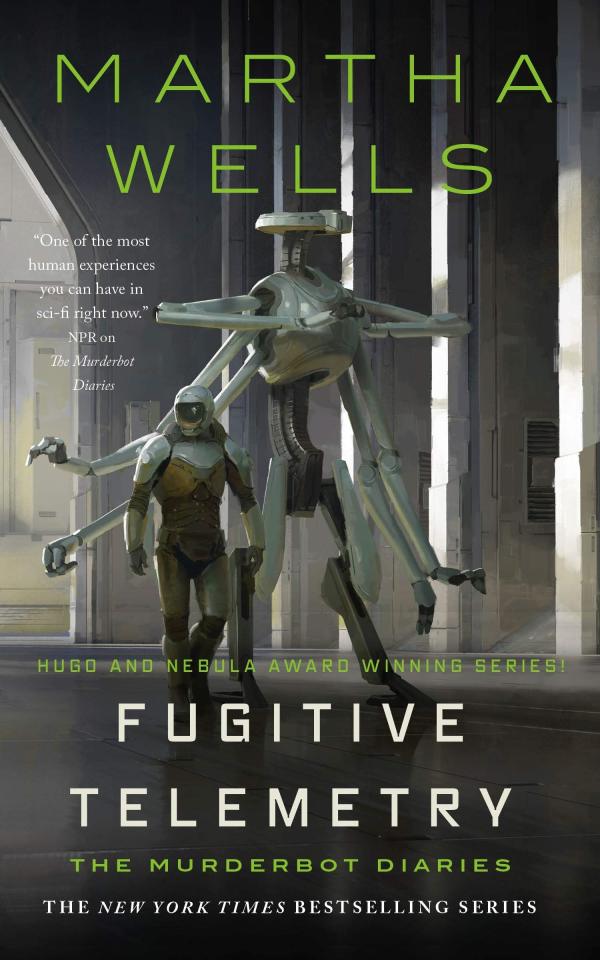
Title: Fugitive Telemetry (The Murderbot Diaries #6) (2021)
Author: Martha Wells
Genre/Tags: Science Fiction, Mystery, Action, Novella, Agender/Nonbinary Protagonist, First-Person
Rating: 9/10
Date Began: 5/1/2021
Date Finished: 5/5/2021
Preservation Station is normally a peaceful place. So when a dead body is discovered in the station mall, Murderbot finds itself involved in the investigation. Much to its chagrin, Murderbot has to team up with the distrustful local security team in order to locate the culprit. But as the mystery deepens, Murderbot realizes that its unique skillset is critical to finding answers-- and saving lives.
Misdirection, let’s try that, "I would have either disposed of the body so it was never found, or made it look like an accident.”
Indah frowned, and Aylen’s brow creased, and they exchanged a look. Eyeing me, Indah said, “How would you dispose of a body so it wouldn’t be found?”
I’m not the public library feed, Senior Officer, go do your own research. I said, “If I told you, then you might find all the bodies I’ve already disposed of.”
“It’s joking.” Ratthi managed to sound like he completely believed that. “That’s how it looks when it’s joking.” He sent to me on the feed, Stop joking.
Full review, minor spoilers, and content warnings under the cut.
Content warnings for the book: Murder and death. Semi graphic violence and injury. References to slavery. Brief reference to past torture.
This review is going to be relatively short, since Fugitive Telemetry itself is a short novella.
I love The Murderbot Diaries for a variety of reasons-- the snarky and relatable narration, the memorable characters, the not-so-subtle political commentary, the tense action scenes, and so on. But it all comes down to Murderbot itself; it's one of the most well-written and distinctive protagonists out there right now. As a nonbinary person, I'm also very representation starved. Seeing not just an agender/nonbinary protag in a mainstream novel, but one written with such depth and respect, honestly makes me cry a little if I think about it too hard.
Give me a soapbox and I'll talk about this series for hours, so I'll cut to the chase. While it's technically the sixth book in the series, Fugitive Telemetry takes place before Network Effect, the previous book. Basically, Murderbot finds itself caught up in a murder mystery on Preservation! And gets to use its talents to figure out whodunit, while winning over the humans who are hesitant to trust it.
Fugitive Telemetry, unlike previous books, doesn't have especially high stakes. All the major characters obviously make it to Network Effect. This book is more of a fun side adventure which expands upon Murderbot's time living on Preservation Station (since Network Effect skipped past most of that). A lot of fave humans make their cameos, notably Ratthi, Gurathin, and Dr. Mensah. And it's just fun, ok? Murder mysteries are fun. (I'd also like to state for the record: I'd die for JollyBaby).
Despite technically lowered stakes, I was very engaged in Fugitive Telemetry's story, especially the late rescue mission. Characterization is a strong point of the series, so I predictably enjoyed it here. Wells (as usual) excels at a believable nonhuman perspective; I'm always impressed at her ability to make Murderbot relatable and focus on details it considers important. There's also a great twist at the end of the book. I love murder mystery setups that have a genuinely surprising conclusion.
It wouldn't be a Murderbot book without some kind of sociopolitical commentary; avoiding spoilers, this entry explores generational slavery and civil rights in a corporate environment. While that's a big part of Murderbot's character arc thus far, Fugitive Telemetry offers a more human-centric perspective. Basically, corporations fucking suck, even (especially?) in space.
I enjoyed Fugitive Telemetry, but I'd love another full length novel in this universe. I know we just got one, but the novellas are short I'm always sad when they end. I also hope the next book takes place after Network Effect, since I really want to see ART and Murderbot's adventures together. Network Effect was a tough act to follow.
If you follow me and haven't read this series, get on that now! The Murderbot Diaries are approachable science fiction adventures that juggle humor and serious subject matter well. I cannot recommend them enough.
9 notes
·
View notes
Note
I just read your thing about paladins and what they're for and holy CRAP does it sum up some stuff that I've been trying to explain for ages, so thank you for that! But now I'm wondering: your footnote mentioned Fjord and Vax'ildan, who both multiclassed into paladin as part of their personal character arc. Would you mind sharing your Thoughts about them? (And if you have any about the other paladins and how they fit in this - Arkhan or Kima or Kerrek or the rest - that would be awesome to see.)
You know I’m ALWAYS ready for a good CR character breakdown :D And for shitting on classic Old School conceptions of what paladins should be, because a quick stroll through the tags has reminded me that, while many people play them very very well, the people who talk about How You’re Supposed To Play Paladins are often wrong as hell. (This includes everybody who wrote 3rd edition d&d.)
I kind of want to start by talking about Kima and Kerrek, rather than Vax and Fjord, because Kima and Kerrek are in many ways two different angles on exactly what I think a paladin character should be. Starting with the premise here that the paladin at its core is about turning ideals into actions, Kima and Kerrek are both awesome at exemplifying the class.
Kima is such a straightforward, action-oriented person. Her belief in Bahamut and her belief in justice are inextricably entwined; she follows her god because she’s sure he’s right about what’s Good and Correct to see done in the world. The ideals –> action pathway is easy and natural for her, because the necessity of taking action in pursuit of her ideals is very clearly one of her ideals. She’s not in conflict with her vows, because she doesn’t need to be. There’s evil in the world, and Bahamut wants her to smite it in the balls, and that’s both effective and fun. (Of note, Kima doesn’t feel personally responsible for destroying every single minor evil ever to exist ever. There’s plenty to go around. Smite the monster in front of you, trust Bahamut to point you towards the thing that really needs killing, and don’t kill yourself over the petty grift of the guy in your favorite bar at the end of the day because yikes, dude, just yikes–that’s how Kima functions as a character, and it’s what makes her an actually functional character.)
Kerrek on the other hand is fascinating because he’s a paladin who thinks he’s lost his ideals, at least at the start. At some unknown time in the past he tried to turn faith and belief (in something, and we never do find out what, and it doesn’t even matter) into change in the world. He got some things done. He utterly failed at some other things. And now he’s sitting here in Westruun feeling like, maybe he can’t, maybe he shouldn’t, maybe everything is a thousand times more complicated and he’s a thousand times tinier in the universe than he ever envisioned when he was younger. He’s sitting there thinking he’s lost his ideals and his drive and his faith–and meanwhile he’s still standing there taking action, doing what he can for the people of Westruun, planting his garden, being angry and disappointed and frustrated and still trying anyway. In spite of himself, Kerrek still believes. In spite of himself Kerrek still does the things he thinks need to be done, even if they’re not the things he wants to be doing, even if he doesn’t think he’ll do any good in the long run. Such a good paladin thing to do.
Then we get to Fjord and Vax. And so much of what makes Fjord and Vax interesting as paladins is, the ideals that compel them to action, compel them to take these paladin oaths, aren’t the ideals of their respective goddesses.
Vax did not wake up one day and say, ‘I believe in the Raven Queen and I believe that what she says is just and right and I will follow her because I believe in her so much’. (He almost, almost got to that point with Sarenrae, circa the Briarwoods arc, and somewhere there is an alternate universe where he did and it is so interesting, but I digress.) And Fjord didn’t really sit down and learn his way through the teachings of the Wildmother and decide, ‘y’know, yes, this is what I love and trust and want to spread in the world’. That’s not the ideal that drove either of them to action.
Fuck, Vax didn’t even like the Raven Queen when he became hers. “Take me instead, you raven bitch.” Why does Vax become a paladin of the Raven Queen? Because he promised. Because he traded himself for his sister. He believes to the depths of his soul in keeping Vex alive, and he believes in keeping his word. The ideal driving Vax to action isn’t worship or admiration. It’s the ideal of following through on his own goddamn commitments.
For Fjord, it’s similar, although a lot less fraught. He doesn’t dislike Melora, certainly–everything he knows of her seems fine, but mostly he turns to her because he’s desperate for help and she seems willing to give it. Fjord’s not great at big lofty ideals, but he is good at people, in his own way. Turning to the Wildmother is about grabbing at the kindness she’s shown him. It’s about grabbing at the kindness Caduceus has shown him. These are the things he trusts.
And yet, Vax isn’t just a paladin to the oath of Keep Vex Alive. Fjord isn’t just a paladin of Not U’kotoa. They both have ideals, and they’re both doing their utmost to follow them here anyway.
For Fjord, being a paladin seems very transactional, yes (free me from this sea serpent and I’ll be your guy, sure), but there’s an enormous ethic of devotion and loyalty involved, coupled with, just like Kima had, a belief in the requirement for action. Fjord believes that it is correct to repay kindness with deeds. He doesn’t entirely understand what Melora wants of him, but she was kind to him in a vast wasteland where he slept unbroken sleep beneath her tree, and she has saved him when he wasn’t entirely sure he could be saved, and of course you repay that in kind. At this point in the narrative, that intense loyalty is the driving ideal behind Fjord’s path as a paladin, and it’s really cool to see.
Vax could have run, when the Raven Queen came for him, and instead he went to Vasselheim. He could have done a lot of things a lot of times. The fact that he offered himself up in a fit of terror isn’t what made him a paladin–the fact that he followed through after that moment was over did.
Another really interesting thing about these paths is that perhaps the most major action our boys are compelled to take, in response to that loyalty, is simply, learn what the fuck you signed up for. Having pledged themselves to these goddesses they are now responsible for figuring out what that even means. There is no easy handbook for “this is what your goddess requires of you, break it and you’re Out On Your Ass”. The Raven Queen asks Vax for extremely little, in the grand scheme of things. He spends a lot of time fighting enemies he would have fought anyway with a little extra backup, and muddling along looking to Vasselheim and old books to figure out what she might want out of him. Fjord’s still taking Caduceus-lessons and trying to figure out what comes next.
In the end it’s hard to even tell whether Vax comes to truly embrace her ideals of fate and finality as his own, or he just submits to them as part of who he thinks he has to be now. That open question is super interesting to me, and I think it’s a really cool twist on the whole classic “paladins take these vows and then HAVE TO STICK TO THEM no matter WHAT” dynamic, where the big vow Vax made is, in fact, to be a paladin. (Even the Oath of Vengeance is fascinating for him–the Raven Queen didn’t ask that path of him, Vax chose it. He decided that was the right way for him to serve.)
I’m so curious to see where Fjord goes from here on his paladin journey. Which of Melora’s ideals is he going to work to enact out of loyalty to her, because that’s the job he promised to do? Which ideals will he actually understand and agree with in his own heart? What oath is he going to take, I’m so fucking curious: Oath of Heroism makes a certain amount of sense but is also kind of self-aggrandizing, Devotion would be awesome for Fjord but also includes that absolute injunction towards honesty, I’m eternally a sucker for the Oath of Ancients and it would make sense for Melora but I’m not sure it’s correct here…
Anyway. Tl;dr that Vax and Fjord are not, entirely, paladins to the ideals and domains of their respective goddesses–not yet. They’re both paladins to the ideal of loyalty, which they’ve given to their respective goddesses, and that’s such an interesting option for the class. It invites so much discussion about the difference between devotion to a deity as an individual, and devotion to what that deity actually stands for. And I fucking love it.
#acelania#critical role#driveby meta attack#paladins#dnd paladin#fucking paladins man#I've got some feelings about this character class#one of these days I'm going to get to play one as something other than the DM#love my NPC paladins so much at least
256 notes
·
View notes
Text
the secret garden (1949) - why it’s my favorite adaptation
hello @renee-mariposa! thank you so much for the ask! while i believe i have answered a question like this before, i don’t think i’ve elaborated as much as i’d like to. so allow me to wax poetic on my favorite adaptation, the secret garden (1949)!
intro
this adaptation really stands out, i think, because of the the era it was made in; i don’t think you could get an adaptation aimed towards kids that is such a sentimental, gothic-lite melodrama with these days, at least without aggressively telegraphing its more emotional moments a la pixar/disney; it’s amusingly blunt and straightforward in that regard, much like the children at its center. there’s not much syrupiness at all. the child actors (margaret o’brien as mary and dean stockwell as colin) are fast-talking as any actor of that era, but in my opinion, the film’s clearly scripted dialogue just makes all the kids seem amusingly precocious.
actors
margaret o’brien as mary is great. i love her stridency, her snobbishness. unlike other adaptations, which downplay mary’s contrariness to the point where her character arc comes across as too subtle by half, the movie upgrades it. not only is 1949 mary contrary, her sullenness has been replaced by a shrillness, snobbery, and the tendency to run to emotional extremes (not to mention a healthy helping of classism). she alienates herself from the other children on the ship to england purposefully, finding them inferior to herself, then attempts to physically fight another passenger when the child calls archibald a hunchback. while this characterization isn’t book-accurate (book mary is a mix of fiery and sullen that none of the films capture accurately imo), i prefer this characterization of her to the closed-off sullenness of the 1993 version or the palatably traumatized 2020 version. 1949 mary isn’t given an obvious freudian excuse for her issues; her parents are just as neglectful, but the film puts the onus on mary for being contrary, which is weirdly refreshing and more attuned to the novel’s perspective. (that isn’t to say that mary’s traumatic early childhood didn’t inform her character in any meaningful way, or that the adults around mary aren’t responsible for how she turned out--but imo the films tend to take an un-nuanced view of the situation in order to make her a more palatable, sympathetic character, which is vastly less interesting than a complicated, flawed one no matter if the character is a child or not). when mary’s character develops and she becomes sweeter, it’s much more impactful as a result of this earlier narrative choice.
brian roper, who was 20 at the time (crazy, right?), plays dickon, and he plays him with a sweet affability that’s hard not to enjoy. he’s a little mischievous, laughing at mary when she accidentally speaks yorkshire (i’ll talk about that in a bit), and has, in a nice touch that i’ve strangely only seen in in the 1994 straight-to-dvd animated film, just as much of a passionate interest in the secret garden as mary does. dickon isn’t treated as mystically as other adaptations, save for the tendency to disappear strangely quickly just when mary happens to turn around (which is a nice nod to his quasi-magical aspects without being distracting, and also adds to mary’s sense of displacement/confusion on the mysterious misselthwaite grounds). he also gets a surprising amount to do in this adaptation, which i love, as someone who strongly believes his character has been under-served in all the film adaptations thus far. in this film, he gets to even enter misselthwaite manor by climbing up ivy into colin’s room in the middle of a storm (albeit offscreen), which is just the kind of adventurous, dramatic touch i enjoy. he also gets probably more dialogue than any of the other dickons (whoo!), as he makes a couple minor declarations--nothing super ham-fisted and melodramatic, as i said the screenplay is rather straightforward and devoid of a lot of corniness you might expect from a children’s film made in the ‘40s, especially with this kind of source material--that are heartfelt without being cloying (one of the benefits of having an older actor playing this kind of role).
colin, played by dean stockwell, is a weaker element to me. he does a good job alternating between screaming (and this movie contains a lot of screaming) and being sweet when the movie calls for it, but i don’t think he was the best choice for colin. while i think it’s awful to criticize a teen actor (stockwell was 13 at the time) for being baby-faced, the fact that he looks significantly younger than o’brien (who was 12) means that his tantrums come off as less a result of arrested development than they should. while he speaks as stiltedly as 2020 colin (who i personally think was one of the best elements of that film), it’s unclear whether that’s the result of the ‘40s fashion of expressing dialogue or a characteristic choice (i’m guessing the former). he can’t help but pale compared to o’brien’s mary, though he is perfectly adequate. he just didn’t stand out for me.
i summed up my feelings of elsa lanchester as martha in my previous, brief review of the movie back in june: “the one major flaw, i think, is actually martha, played by elsa lanchester; her portrayal is odd, feels definitely tone-deaf. her constant shrieking laughter feels very forced and unconvincing. in her few scenes, she jars everything to a halt in terms of believability.” she was significantly older than brian roper, being in her ‘40s playing a character heavily implied to be in her mid-teens to early twenties, and as a result feels out of her depth. her establishing scene is probably the worst, although i’ve warmed to her other scenes as time’s gone by.
tone/atmosphere
in general, i think the ‘49 film does a wonderful job expressing the gothic implications of the original book, even emphasizing them by casting misselthwaite manor largely in shadow and having mary and mrs. medlock first arrive in a carriage pulled by black horses on a dark, stormy night. it makes the bright outdoor scenery seem that much more inviting in comparison. burnett’s robin is also replaced by a raven, who also takes on aspects of dickon’s crow soot, as he is friends with dickon and hops on his shoulder occasionally. while it divulges from burnett’s book, i think a raven makes a little more sense in this adaptation, which amps up the eeriness of the original story; it gives mary’s journey a little more of a fairytale aspect, i think, and is overall an understandable and palatable change.
plot
the big plot development that divulges from the novel is the presence of a subplot where, due to a misunderstanding of an axe and a tree in the titular garden, mary and dickon fall under the impression that archibald killed lilias. now, this is a pretty bizarre plot, don’t get me wrong, but it doesn’t take up much of the film; it’s charming in its strangeness, and fits well with the idea of innocent children struggling to understand the complicated adult world—which is itself a theme original to the story that i’m kind of a sucker for, in general. it also serves as a bonding point for dickon and mary, whose friendship largely feels passed over in film adaptations.
and, of course, there’s the big plot-breaking point near the end, where archibald goes to tell colin that he’s selling misselthwaite and going to move to europe with him. an obvious plot point that conflicts with this scene is that colin, in the book, has no relationship with his father. again, it’s an odd adaptational choice meant to amp up the stakes, but it doesn’t impede my enjoyment of the film as a whole. the presence of two doctors—one, a hapless neville craven figure named dr. griddlestone, and the other is obviously inspired from the book’s “doctor from london,” who insisted all colin needed was fresh air, food, and exercise—gives the film some psychological weight. despite the disappointing element of all of colin’s neuroses being blatantly the result of his father’s emotional ailments, which i think is a lazy way of reading the original novel’s portrayal of colin’s illness, i think the way this development was executed in the film was tolerable—and i’m a sucker for children’s films that don’t think anything of including long conversations between adults about psychological issues. like, you can’t help but respect a film like that!
the garden
something i also love about this adaptation is that the garden isn’t a huge part of it; it represents more of a place where mary and dickon and colin can foster ideas and grow rather than a place of orgasmic beauty. there’s not a surplus of lavish panning shots, really, like in the ‘93 film, and it lacks the magical realism of the 2020 film. the garden itself is more transparently a plot device, which i actually like—it gives more room for the children to center themselves.
individual scenes
and the pacing of the film is actually really nice, i think—probably the best out of all the films. i love the ‘93 film with all my heart, and it’s definitely gorgeous in its own right, but i think it gets a little sluggish; this film is paced beautifully. there’s no fat, really.
there’s a scene i really love that shows the passage of time from winter to spring in a super succinct, stupidly obvious way that nonetheless works because of the innocent sweetness of o’brien’s delivery. like, it’s very old-fashioned and sentimental, but gah, it gets me every time.
youtube
it’s time to talk about the scream scene!
youtube
this film stole my heart the minute mary screamed wholeheartedly at colin that she hopes he dies. there’s a dark comedy to this whole scene; these two maladjusted, spoiled children trying to out-scream one another while tearing down curtains and knocking down tables full of food higgledy-piggledy?? you just can’t get better than that!
if you’re adapting the secret garden, i strongly feel you can’t soften the children’s meanness, their sharpness and ugliness. their tantrums must be harsh and grating and horrible! they have to really let loose! the rawness of the children’s emotional dysfunction contrasted against the buttoned-up stiffness of edwardian england is one of the fascinating aspects of the novel i love to think about, and you just can’t get that contrast if you don’t have the children be genuine terrors! i think this scene puts that nicely, more nicely than any of the other films, which pussyfoot around colin’s intense tantrum too much to be nearly as effective. i get giddy whenever this scene comes on; it’s brilliant.
there are so many little details from the book that i love: that the children speak yorkshire to one another, mary singing her ayah’s song to colin,
youtube
dickon’s “i will cum bak” note (here written as “i will kum back”), the mention of dickon’s mother sending them bread to eat to make them strong. it’s all so nicely implemented, and reminds me of the joy of reading the book for the first time.
but the scene i love most is one entirely made up for the film. in it, mary tells colin about the garden, but wraps it up in fiction wherein it’s a sort of child’s eden, only accessible for children like themselves. that gets to the heart of why i love the book moreso than any other adaptation i can think of. it’s a children’s paradise where the innocent, inherent goodness of children reigns. it makes me tear up almost every time, despite the scene’s brevity.
youtube
miscellaneous
there are some little details that i love about this film: the fact that mrs. sowerby is spotted in one scene where we see dickon at his home, feeding a lamb (and the implication that mary was so darn excited about finding the key to the garden that she ran all the way to the sowerbys’ cottage, five miles away from misselthwaite, to show dickon), mary’s clearly false story to colin about being surrounded by tigers and elephants in india, mary threatening to tear people’s gizzards out, mary telling dickon she hates him because he (gasp) dared to know about colin so she couldn’t reveal his existence to him...there’s a lot to enjoy about this film. it definitely isn’t the most accurate to the book, but it’s one of those films that i could watch over and over again.
aside from some superfluous subplots, it’s a lean adaptation that still captures all the essential elements of the book to at least to a degree. i can easily imagine some very indignant little girls in 1949 insisting that no, the raven was a robin in the book, and there was no implications of murder, either, but i love it in all its simplicity. i think you need a little old-fashioned sentiment to make a film adaptation of the secret garden successful.
#the secret garden#frances hodgson burnett#the secret garden 1949#mary lennox#dickon sowerby#colin craven#margaret o'brien#dean stockwell#brian roper#elsa lanchester
13 notes
·
View notes
Text
“Picard” S1 Review: Doesn’t boldly go but is nonetheless engaging
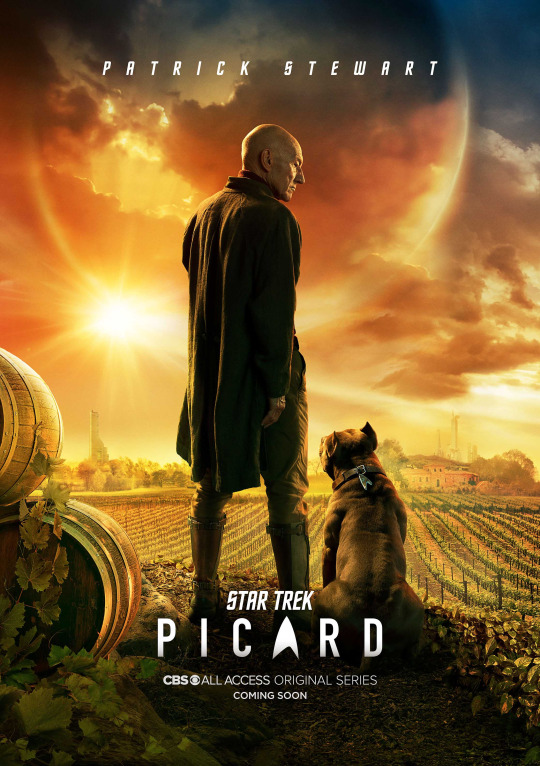
Produced by CBS All Access
Starring: Patrick Stewart, Isa Briones, Allison Pill, Michelle Hurd, Santiago Cabrera, Evan Evagora, Harry Treadaway
Many fans had high hopes for “Picard” going into CBS All Access’s continuing voyage into the Star Trek franchise.
Fans wanted to see the lore finally expanded into the future after its previous three ventures (Enterprise, Abrams Trek, and Discovery) took place in the past, bring modern themes and ideas to Star Trek’s futurist’s world view in a way that felt fresh and relevant, but most importantly continue the story of the franchise’s greatest captain; Jean-Luc Picard, of course.
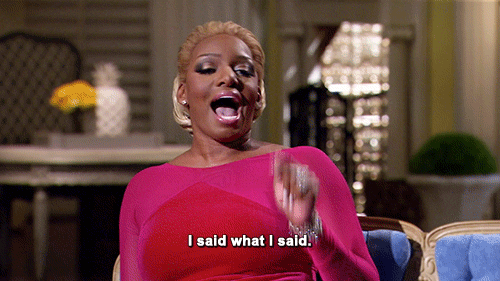
(He’s the best captain. This is not up for debate. Don’t @ me!)
In some ways the new series succeeds at this. We get glimpses of the previously untouched world of Star Trek post “Nemesis,” new themes that are resonant with real world events and exploratory, even critical, of the Federation’s worldview, and of course plenty of Picard himself as he navigates the strange new galaxy he inhabits.
But Picard ultimately misses the mark due to rushed storytelling, half-baked side plots, and just plain poor execution overall. It’s sad because “Picard” and this very talented cast and production team have their moments throughout this first season’s ten episode run but somehow even with 10 episodes of content to work with fans still end up with a somewhat jumbled mess.
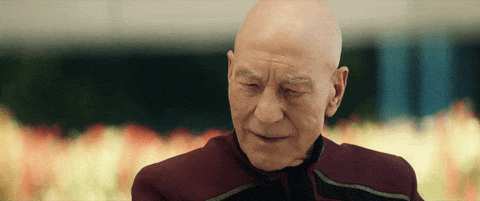
(Me by like the eighth episode.)
This isn’t to say “Picard” isn’t worth your time if you’re an avid Star Trek fan or just someone who likes Patrick Stewart in this role in general but the first season will leave you still hungry for more and not in a good way.
“Picard” continues the story of the titular captain, now retired admiral, many years after the events of “Nemesis” as a retired Jean Luc reflects on his life in Starfleet and of his late friend Data who gave his life for his. A synth ban has been enacted in Starfleet after a major riot on Mars some years prior and Picard is understandably sour on the idea, given his relationship with Data, while also fighting Starfleet on not helping the exodus of the Romulans after the supernova that wiped out their homeworld in “Star Trek (2009).” When a young woman comes seeking Picard’s aid after an attack by mysterious assailants, revealing that she is an android and the possible daughter of Data, and gets killed, it is up to the retired Admiral to find her twin sister before she suffers the same fate.
Before we get started let’s throw out some of the bad faith arguments on why this series wasn’t all that good.
“Picard” doesn’t suck because it has “politics” in it. At this point, if you are complaining about the existence of social viewpoints and political/philosophical discussions in your Star Trek, or let alone any series for that matter, I don’t know what the hell you’ve been watching the past few decades. Star Trek has always been more than just a show about cool-looking spaceships and laser beams, you neckbeards.
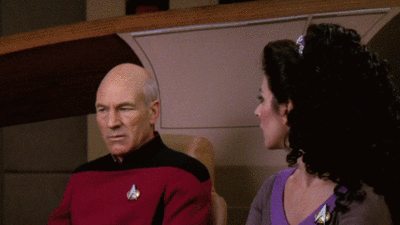
(Hell, even the other “Star” got more going on in it than that.)
It’s also not bad because of female representation or “girl power.” Again, Star Trek has always had this and frankly having a few more instances of the women of Trek taking center stage doesn’t even come close to rebalancing the scales on the overall massive representation of cis white men across the genre and even the series anyways.
Also get the fuck over the use of curse words in this series. While certainly some instances in this show felt awkward, the use of the word “fuck” does not dilute Star Trek’s overall story.

(It would have made earlier season’s funnier for sure.)
Now that that’s out of way let’s get into the real reasons that, for me at least, the series fell short of an otherwise promising goal of delivering great new Star Trek.
The main problem stems from the series overall jumping off point in its first episode. Picard is understandably still upset about the death of Data and having him deal with survivor’s guilt is a great way to bring this character into the future and reexplore the humanist viewpoints Data touched on in the older series. But also having Picard deal with his fallout from Starfleet, both from the synth ban AND the Romulan exodus, creates chasmic diverging plotlines that never quite come together. The story really needed it to be one or the other. Either Picard wanting to advocate for the continued existence of synthetic life or the rescue of the Romulans post super nova. The latter is touched on a bit through the addition of the character Elnor but doesn’t quite work given that majority of the Romulans in this series are portrayed as villains.
There is definitely a post Brexit, anti-immigrant hysteria message being told there but not enough depth and nuance is given to make it look like Starfleet was particularly wrong here to abandon them given that they do end up being spies committing espionage in the Federation and the clear villains of the first season. The showrunners could have brought these two stories together by perhaps making Soji a Romulan bent on bringing down synthetic life because maybe her twin sister died in the riots on Mars, making Picard have to choose between his commitment to both minority groups abandoned by the Federation but of course, that’s not what the series goes with.
Also suddenly shoehorning in a convoluted anti-synth worldview into the already ultra-secretive Romulan empire was muddled to say the least.

(A decent summation of the Romulans, pretty much ever. Also why is the only Asian actress in this scene in Osaka depicted as an alien, Mr Kurtzman?...)
Some of these ideas could’ve been saved through better editing and pacing though but not enough is done in this first season to mitigate these issues. Too much of plot is told through plain exposition; people sitting down and talking for five-ten minutes about prophecies and backstory instead of having the story simply show us instead. It makes the pacing often slow even by Trek standards and grinds the action to a halt even when there are lasers being shot at one another in the next scene.
Many of these plots get barely any attention too. The Borg cube, why it’s abandoned, and why Hugh is working for the Romulans through the Federation is given surface level development at best. Seven of Nine returns and at one point is momentarily hooked up to the Collective and she doesn’t really say much about it after it happens. The new character’s Rios and Raffi both have side stories given to their development that get touched on once and never brought up again. Dr. Jurati straight up murders her lover and is set to turn herself into the Federation and it’s just kind of forgotten about in the finale. And Elnor, well, he gets to do his best Legolas impression slicing and dicing fellow Romulans with his sword I guess.
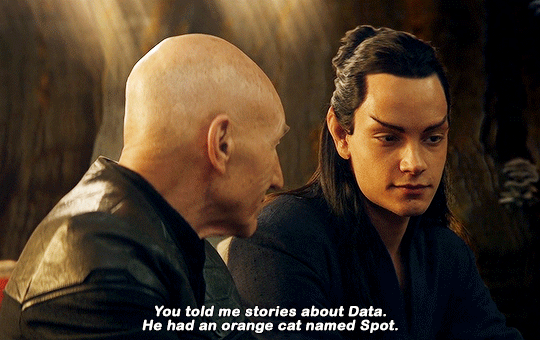
(He is still best boi though :3...)
The main co-star however, Soji the perfect android, has a particularly rushed development going from a scientist unknowing of her nature, to supposed prophet of doom, to predictably the savior all in one season. Her arc needed more time to develop with perhaps her Romulan love affair with Narek being the first season’s main driving force and her realization as an android being the climax.
Instead we get basically four seasons of Battlestar Galactica’s Sharon arc crammed into one season and it unfortunately makes the story feel half-baked.
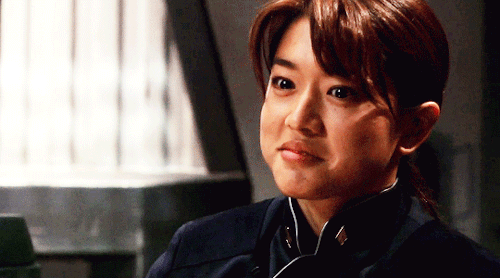
(Ok, Boomer.)
Don’t get the wrong idea, all these new characters have great individual moments as well throughout the season but sooooo much side plot is shoved in already into a muddled overarching narrative that it feels like several seasons worth of storytelling stuffed and edited down into a ten episode arc. Why the series felt it needed to conclude this robust story about synth hating Romulans in “Picard’s” first season feels like an unforced error in this reviewer’s opinion even if Sir P Stew only has maybe a couple seasons of extensive acting left in him anyways.
But the season isn’t completely worthless, as much as this review has been spent dunking on its less than stellar parts. The cast is exceptional, even working with the spare parts they’ve been given. Episode 5’s “Stardust City Rag,” in particular, stands out as a good mix of old and new Trek, with a decent dosage of cheese featuring Patrick Stewart trying on a French accent in a space bar. Santiago Cabrera is delightful as the ship captain Rios while also playing various forms of himself in AI form in equally enjoyable roles. Evan Evagora is fun as the deadly yet somewhat aloof Elnor, even if his character doesn’t do all that much except cut up a few Romulans. Seeing Jonathan Frakes and Marina Sirtis reprise their roles as Riker and Troi respectively in episode 6 was heartwarming and felt the most like TNG out of all the episodes. And Jeri Ryan seems liberated in this series in this version of Seven of Nine, no doubt glad to be rid of that restrictive corset and Rick Berman’s meddling hands.

(Big “Fuck you, Rick Berman” energy going on in this scene.)
The production value is obviously high level as Trek has rarely looked this good on the small screen. There’s some great cinematography throughout the season whether it’s Picard’s chateau winery, the haunting nature of the Borg cube, or the synth homeworld in the season’s final beats. The spaceships look cool as always and the world of the future feels well futuristic.
The musical score is also top notch, with a great opening theme that feels very much in line with Trek at its futurist glimpse into a hopeful cosmos.
youtube
The season’s best moments though are between Picard and Data and will remind you why they were more than likely your favorite characters on TNG. Generally speaking, exploring the humanist themes of artificial intelligence in new Trek was a good choice and having Picard deal with survivor’s guilt kept the pulse of the muddled story still beating. Brent Spiner is still great as Data and will remind you all again how talented he has always been as an actor and though his age seeps through the makeup a bit he is nonetheless still a perfect android.
Though the finale as a whole is underwhelming, the characters do share a nice final moment that is both touching and reminiscent of everything a fan loves about Star Trek. It’s a great cap to an otherwise ok return to Star Trek for TNG’s top characters and its truly touching in the best way that this franchise has always been known to be.
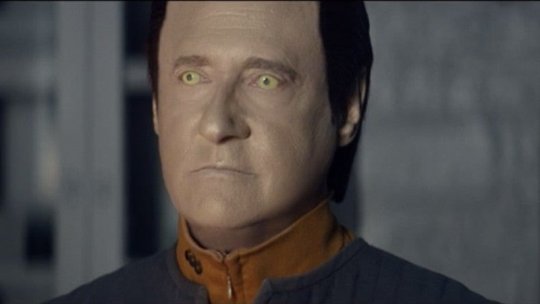
(Deactivating my emotions chip because I just..can’t! I just can’t, ok! *Sobs*)
But great acting and high production value can only mask so many flaws with a convoluted plot and “Picard” unfortunately suffers from the bloated and uncooked nature of its many ideas. What the story really needed was three season arc not just ten episodes and it shows. I guess the plus side is with this particular plot wrapped up it leaves the door open for new ideas and a fresh start in the second season but it does feel like an overall miss for Picard’s homecoming back into the universe of Star Trek.
Overall, though there are worse ways a Star Trek fan can spend their quarantine than watching “Picard” and there’s certainly enough here for fans to latch onto and have hope for better things in the next season.
Hopefully things are less rushed or at least more focused in the second season and we can see a more proper return to form for both Picard and future Star Trek.
Here’s hoping the producers and writers make it so…
VERDICT:
3 out of 5

Let’s hope we get a return of Q in the next season.
#Star Trek#Star Trek Picard#Picard#Jean Luc Picard#Patrick Stewart#CBS#CBS All Access#Star Trek TNG#TNG#the next generation#Data#Star Trek Data#Brent Spiner#Sci Fi#science fiction#TV show#review#reviews#TV#gene roddenberry#Coronavirus#Covid19#Covid 19#Covid-19#quarantine#lockdown#Jonathan Frakes#marina sirtis#battlestar galactica#BSG
31 notes
·
View notes
Note
Since the old villains in Word Up have been reformed, mind sharing what happened to them and how they turned their lives around? Do they play any part in Word Up?
Okay, so this time I was smart and decided to type this out in a word document!
Long post warning!
Before getting into each individual villain (or most villains, there’s just so dang many of them! I’m sure I’ll forget someone!) I want to talk about them as a whole.
All of them are reformed, and Tobey was basically the start of it all. He inspired several other villains, who inspired others, and over the years they all slowly gave up villain life. The last ones to quit (either BLHG and Invisi-Bill or Rhyme and Reason or both) did so after WordGirl retired from being a hero, because “everyone else did it and it’s not going to be any fun without WordGirl!”
After a few villains went good, Tobey and Dr. Two Brains co-founded the Anti-Villain Association (AVA), which was designed to be a place where villains, or even just minor criminals, who wanted to go good could go to discuss their struggles and experiences with switching sides (it’s kinda like a villain AA meeting). I don’t have many plans for each individual villain to play a major part in the story, again because there’s so many that would have been hard, but the AVA does play a part and so, by extension, the villains do play a bit of a role. However, I think most of this will go to Two Brains since he’s the co-founder and the other co-founder will be busy with all the other plans I have for him XD.
Many of their old weapons have been discarded, but also many of them are still around. For some, it’s to use in case of emergency (like a break-in), others have found other uses for their weapons (you better believe Chuck uses his condiment ray to make sandwiches!) others just couldn’t bear to destroy them (Tobey still has some surviving robots that were designed to crush the city, they’re happily living deep deep deep in the woods because Tobey didn’t feel right about destroying them for no reason), and some weapons are more difficult to destroy (like Mr. Big’s mind control, I’ll go into that a little more when I talk about him.)
Very few of them had kids, for a couple of reasons. 1. Many were too busy trying to turn their lives around to make a family life a priority 2. Many didn’t think they’d make good parents given their criminal history 3. There’s like 30 something villains and I wasn’t about to create children for each of them that’s just so many characters I would have had to make from scratch and I already had Theo, Julie, Emma, and Daisy, not to mention the new villains I had to make and I wanted everyone to have a little bit of depth so yeah… The ones who did have kids (and I might forget someone so sorry in advance if I did) are Tobey (obviously), Victoria, the unnamed henchman of Dr. Two Brains and The Butcher
Now let's get into them individually. Many of them I don’t have the story (at least not yet, if I get time I may start brainstorming that) of why they retired as villains, but for almost all of them I have ideas on what they’re up to now because I thought that was a little more important.
Dr. Two Brains- Was the second villain to retire. He saw Tobey doing such a great job and realized he missed that life for himself and said, “well if that little shit can do it, so can I!” He knew he could ignore the mouse brain’s evil desires, as long as he could fulfill its cheese desires, so his first step was to find a legal way to get a lot of cheese. So, he and his henchman started making cheese! And because Two Brains couldn’t wait, he decided to make a cheese aging ray. Suddenly he was able to produce quite a bit of cheese in record time. And actually, could make more than he could eat. He started selling his cheese and now is the main source of cheese in the city! The company slogan is “Evilly delicious!” And I was thinking about this today at work and realized he’s probably made a lot of money from this because with the aging process completely cut, he can probably charge less, but there’s something called “perceived value” where people think if something is super cheap then there must be something wrong with it, so you want to shoot a little higher when pricing products, so Two Brains probably has to have his cheese priced higher than he needs, so he probably has a pretty decent turn over rate! Anyway! As mentioned above, his unnamed henchman had a daughter, who Two Brains considers a granddaughter. She is aware of her interesting family’s criminal history and accepts it. She loves cheese but she’s not a fan of helping in the cheese-making process.
Chuck and the Butcher- (their stories are so linked it just made more sense to talk about them together) Were the third and fourth villains to go good and did so pretty much at the same time, for similar reasons, those reasons being “this isn’t fun anymore, I’m not getting anywhere with it, and look at what a great job Tobey and Two Brains are doing!” After retiring they partnered up and started a sandwich food truck, which today is a full-blown restaurant. Chuck does most of the sandwich making, but Butcher helps and he’s the meat supplier (guess where they get their cheese from!). I mentioned that the Butcher had a child. He has one son named Kale and a grandson named Baker. His son and grandson have powers like him, with Kale’s being vegetable related and Baker’s being bread-related (bread, not pastries! Important note! However, Baker does like to bake pastries, he’s about eight BTW). Kale and Butcher’s relationship will have a bit of focus in Word Up, and Kale will be a reoccurring character. Kale is very prideful and independent and will do just about anything for Baker. Kale is aware of his dad’s criminal past, Baker probably is aware too, but IDK maybe not. Chuck being close to the Butcher is naturally close with his family. Besides that, he still spends a lot of time with his mom and Brent, who he has a bit of a healthier relationship with now.
Granny May- The fifth villain to retire, and she basically just retired. She basically said “well I’m done! This is getting old and so am I!” She’s still alive, currently having the honor of being the oldest person in the city and is living in an assisted living facility. She’s pretty “together” mentally (how I describe residents at the assisted living facility I work at who haven’t been taken over by dementia yet). She uses a scooter now but carries a cane with her. Why? To whack people who need to have some sense knocked into them of course! Other AVA members are happy to pick her up for their weekly meetings and drive her back home, despite her claims that she could still drive fine “if they would let me!” (don’t let this woman go behind the wheel anymore, don’t listen to her!)
Mr. Big and Leslie- Mr. Big was inspired by the villains before him turning their lives around and claiming to be much happier. He tried this and struggled a lot. He eventually realized his issue was greed, it was too strong for him. So, he gave everything up, he gave his company to Leslie and basically became a minimalist hippie (again, my love for irony shines through!...also I thought the idea of Big being a hippie was HILARIOUS). Leslie has run the company ethically ever since. Today it’s essentially Amazon with morals. Mr. Big and Leslie are friends and talk all the time. Their mind control tech is still around, the reason I’ve decided is that some of the later tech was so powerful that destroying it might unintentionally send out a mind control signal. I’m open to better suggestions; I just need the mind control tech to still exist and be something someone could steal…hint hint….
Ms. Question- Eventually got a job as an interrogator for the police station! She’s the best interrogator there is! She doesn’t typically use her powers on people to get them to confess, usually, they just break from the mass amount of questions she asks, but in more extreme circumstances she is willing to use her powers.
Learnerer- Like Ms. Question, Learnerer found a better gig with the police force. He’s the city’s detective, and rocks at it with all his “learninging” skills. He looks for clues and learns how criminals commit crimes and uses that information to catch criminals in the act and stop them. He often works with Ms. Question.
Amazing Rope Guy- Actually got decent at rope tricks and is an entertainer now! I won’t say he’s incredible, but he’s alright! The other AVA members often hire him for entertainment events (he’s been to several of Theo’s birthday parties and Theo has politely asked his parents to not do that anymore, so now they’re gonna hire him for Julie’s parties) more to support him than because of his skills
Whammer- is a professional demolisher. You need an old building torn down? Call the Whammer! You need to gut the kitchen of a house you’re flipping? Call the Whammer! Need to clear an area of land for a project? Call the Whammer! Need snow off the street so people can get home? Call the Whammer. He loves his job
Lady Redundant Woman- She kept moving up in her job at the copy place, and eventually had learned to do every position there. With this knowledge and skills, she opened up her own copy place where she and her copies are the sole employees. Turns out your business can make a lot of money when you can have the exact right amount of employees at all times and don’t technically have to pay them because they’re technically you!
Hal Hardbargin- Sold his villain inventions and blueprints to the police station so they could have a better understanding of how certain villain gadgets work and therefore how to stop them. Also has made a few honest weapons for some heroes
Seymore- Hosts a self-made YouTube (or YouTube-like website) show called “Can You Spot the Scam?” where he helps innocent citizens learn how to spot scams
Big Left Hand Guy and Invisi-Bill-I never could think of what they’d be up to, so I decided they are still trying to figure out what they should do next. (because my favorite thing when I have a writing problem is to take advantage of it and turn it into a plot point! …something I did with a very important plot point in Word Up that will be revealed in Return to Fair City)
Rhyme and Reason- again I don’t have too much an idea of what they’re up too, but I like to think they are a QPR because I like platonic partnerships!
I talked about Victoria and Eileen here Thanks for the question! Feel free to ask more!
35 notes
·
View notes
Text
Unfulfilled Dream: An Introduction to Finn and House Leonster
This is intended to assist fans of Three Houses, and specifically Blue Lions fans, in understanding what the hell FE old-timers are talking about when the names “Quan,” “Finn,” and “Leif” come up with regard to Dimitri and his retainers (and Dimitri/Dedue in particular). You may have encountered these characters in FE Heroes, but there’s a lot more stuff out there and it’s not all in one place, or even readily available in translation. So here goes.
So, as a starting point, Azure Moon route of Three Houses is heavily influenced by Thracia 776 (aka FE5) and the more familiar you are with FE5, the more evident the parallels/echoes are. But going backward from Azure Moon to its inspiration, or to Genealogy of the Holy War (FE4) which served as an inspiration for Three Houses itself, can be really confusing.
We have the two games, FE4 and FE5, both of them for the SNES, neither of them ever given a worldwide release. Both have modern, very good patches so if you want to play them, it’s a much better user experience than it used to be. We have two artbooks, Treasure for FE4 and Illustrated Works for FE5, both of them only partially translated via websites and translation blogs. We have developer notes and interviews. We have the appearances of these characters as Einherjar in Awakening. We have their modern appearances in Fire Emblem Heroes. We have the modern run of Cipher cards as well as much older TCG cards. And finally, we have various manga and light novels, many of which have been fan-translated of late but also rather... dubious as “game canon.”
So, to grasp Quan, or Finn, or Leif, it’s a bit like being told “read 100 support conversations plus some DLC that never got translated,” right?
Here are the basics that might be of interest to Three Houses fans!
Quan is the prince of Leonster, a small but wealthy kingdom on the Thracian Peninsula, which juts eastward from the continent of Jugdral. He carries the Major Holy Blood (so, kind of like a Major Crest) of Njörun, one of the Twelve Crusaders who liberated Jugdral from an evil cult several generations before. His holy weapon is Gae Bolg, aka The Lance of Love and Sorrow, reputed to be cursed. Quan generally at war with his neighbor to the south, King Travant of Thracia (a poor nation), who also has Major Holy Blood and is a descendant of Dáinn, Njörun’s brother. Each of them wants to unite the Thracian peninsula and rule over the whole thing; despite an Irish naming scheme, Leonster was inspired by Italy and is supposed to be an elegant, fashionable place with a thriving middle class. Quan attended a fancy military academy in the center of the continent (the direct inspiration for Garreg Mach!) and has two close friends from other nations, Eldigan and Sigurd, also heirs to holy bloodlines. The three of them swear an oath to always have each others’ backs and Quan marries Sigurd’s sister Ethlyn, who has minor holy blood (like a minor crest but with no holy weapon access). They have two children, Altena and Leif.
Finn starts off as Quan’s page. I say “starts off” because FE4 and FE5 follow him over the course of twenty years. He’s the child of a noble house in Leonster, and when he was orphaned he was sent to the castle to be raised/educated. He’s not skilled at making friends but he does become Quan’s page and grows to think of Ethlyn as a big sister of sorts. When Quan and Ethlyn go to war across the continent to assist Sigurd, Finn wants to come along and they take him, even though he’s maybe fifteen and barely old enough to fight. Quan mentors Finn (which is something we see in FE4 itself), building his confidence up, telling Finn he’s the most promising knight of his generation, bequeathing Finn a special lance of his own, and ultimately entrusting Finn with guardianship of Quan’s son and heir, Leif. Finn in turn becomes utterly devoted to Quan and to Quan’s ambition of ruling all of Thracia.
A word about devotion. This is not “devotion” in the sense we’ve seen from Frederick or Jakob in recent FE games, where it’s performative and kind of amusing, with complicated tea rituals and recruiting slogans and whatnot. This is straight-up utter acceptance of someone else’s dreams and ambition as one’s own purpose in life. Hold that thought.
Anyway, Quan and Ethlyn are ambushed and killed by Travant shortly after Leif is born; every knight in their party is massacred in the Yied Desert. The rest of the continent is falling under the sway of the Grannvale Empire (Eldigan’s already dead, Sigurd dies shortly after Quan&Ethlyn), and Leonster is able to hold out for a couple of years before it falls to a one/two attack by Travant’s Thracian army and the Grannvale Empire. Finn, who’s been caring for Leif as his guard, escapes from the burning castle with Leif in his arms (Leif’s grandmother Queen Alfiona dies in the blaze; his grandfather King Kalf died shortly before on the battlefield, betrayed by allies).
The Yied Massacre and the Fall of Leonster are the Jugdrali psychological horror-show that parallel the Tragedy of Duscur’s impact on House Blaiddyd. Finn is devastated by the fact that his duty to Leif kept him from Quan&Ethlyn’s side during the massacre because dying with them would’ve been preferable to surviving them. He hasn’t recovered from that when Leonster falls in an inferno that traumatizes him for, as far as we can tell, the rest of his life. As Leif tells it, Finn then shut down emotionally to the point where he neither cries nor laughs. Of course, Leif himself is scarred by the memory of the burning castle, and that and the loss of his parents fuels his own rage and desire for revenge. Leif is also bothered by the fact that he only has minor holy blood from his parents, which is much less impressive than having two minor Crests because he can’t use any holy weapons. On the other hand, two types of minor holy blood don’t kill you.
(I think at this point many of y’all can see how these events are echoed in Azure Moon. The atrocity, the survivor’s guilt, the fallout on both a child prince with a heavy burden and his retainer who’s struggling with his own issues.)
After this, Finn has nothing aside from his duty to Leif, and as he sees it his duty to Leif is ultimately to see Leif placed on the throne of a unified Thracian peninsula as its sole king. He raises Leif and Leif’s companion Nanna/Jeanne (Jugdral is complicated) under a variety of harsh & tragic circumstances for the next thirteen years. Sometimes he has to forego meals to feed the kids. The people who assist him usually end up dead. At least once he gets betrayed by the citizens of the town they’re hiding in. And so on. These are not circumstances that really allow one to recover from trauma, and by the time Leif himself is fifteen years old and the game plot of Thracia 776 begins, Finn still doesn’t give a damn as to whether he lives or dies as long as he can see Leif made King of Thracia. This is where the portrayal of Finn in Fire Emblem Heroes comes from-- by this point he’s about thirty-four and he really hasn’t had a good day in his life since he was about nineteen.
One of the Cipher cards probably says it the best: His fallen master protected him, saw him through to adulthood, and entrusted him with an unfulfilled dream, and now Finn leads the way to a new era in his motherland! That complete, utter, unswerving dedication to Quan and his unfulfilled dream is what brings Finn to mind when discussing Dedue (cutscene after Gronder in Verdant Wind, anyone?) It’s not funny. It’s tragic. It’s kind of disturbing. Thracia 776 offers a lot of commentary on knights and knighthood-- not as savage as the discussions Felix has with his Blue Lions comrades, but pointed nonetheless-- and with Finn as the Jugdrali exemplar of A Knight, that criticism rebounds, directly or indirectly, on him. Knighthood is kind of effed up and so is Finn.
Finn does get the opportunity to get his revenge on Travant in FE4, as both he and Leif have boss-battle conversations with Travant making it 100% clear they’re after revenge (Leif even speaks of killing Travant with his bare hands!). Travant’s death helps clear the way for Leif to take the throne of Thracia after the war... and with the dream at last fulfilled, Finn disappears, apparently into the Yied Desert where Quan and Ethlyn died. (He does come back three years later.) He’s got nothing else in his life. He’s seemingly not equipped to take over the usual veteran-knight role as some kind of advisor or general... or, after all that, he just WANTS to disappear for a while.
(You say, this is pretty TL;DR for “the basics”; I say, “I left a lot of stuff out, especially wrt shipping” because Jugdrali shipping is complicated.)
Anyway, so that’s the outline of the plot stuff. Note again, this takes more than twenty years to play out-- more than double the time elapsed between the Tragedy of Duscur and Dimitri’s final victory in Azure Moon. Jugdral is a long, long, hard slog for the characters that survive it.
Now, here’s where we get to the interpretive part. Finn’s devotion to Quan (and thence to Leif) and his trauma and self-abnegation are not up for debate. Hell, FE Heroes provides a pretty fair encapsulation of it. What Heroes also conveys is the sheer depth of his grief for Quan after fifteen, seventeen, twenty years... a grief that leads a number of fans, including me, to see a romantic subtext there. Maybe Quan, as a happily married man with two kids, wasn’t ever thinking of his page-turned-protege like that, but in between some interesting bits of dialogue in FE5 about Finn being “cold to women” and his current portrayal in Heroes, it does create the impression that at the very least Finn’s feelings for Quan went outside the ordinary bounds of the lord/retainer relationship. As Jugdral by its nature doesn’t lead to the sorts of paired endings we see in Three Houses, that’s really something fans have to experience for themselves.
If that interests you, hopefully this essay has provided some pointers on where to find material. Have fun!
#fe16 spoilers#blue lions meta#jugdral spoilers#jugdral meta#leonster bias#finn of leonster#long post#text post
56 notes
·
View notes
Text
Devin’s Playlist -2010s Part 1
This is an unfinished retrospective look at what I listened to during the 2010s. This decade was exceptional for me, as it was the first decade where, for almost all of it, I was not a musician myself.
Being a musician forces you to listen to music like a musician, and being free of that, and able to listen as a listener alone, really made this a spectacular decade for me. I found dozens of incredible albums that were released during the decade, many of which received no significant recognition.
This was a very large project, and I did not finish it. I made it through Retrowave, Shoegaze, and Post punk. If anybody cares, I will finish the entire project, which will add Dreampop (the largest category), Vaporwave, and Dark Ambient.
Retrowave: Retrowave is electronic music that, at first listen, sounds like it may be from the 80s or 90s, mostly because the synths it uses to generate the music are either retro-inspired or literally retro equipment in some of the more extreme cases. It generally features original compositions, often, but not always, is instrumental. Rough vocals would impede the tightness and angularity of the music, so when vocals are used they are often pop produced and highly melodic. This genre gained significant exposure from Nicolas Winding Refn’s 2011 masterpiece, “Drive”.
Galactic Melt (2011) Com Truise
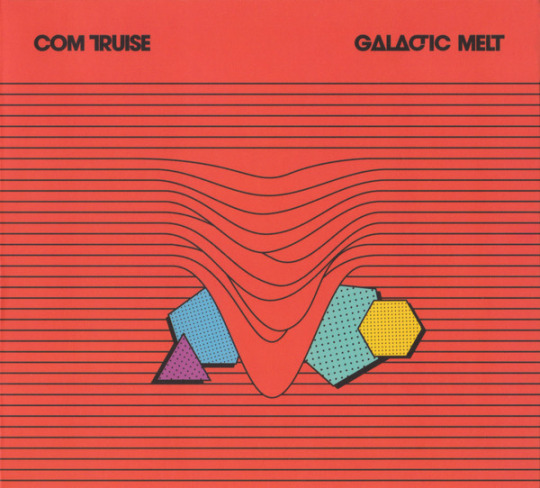
Electronic artist Com Truise rose to prominence off of this fantastic record, which rallies around the undeniable electro anthem of 2012, “Brokendate”. Starting with some found audio (chopped and screwed found audio becomes a big deal later on in Vaporwave) and then dropping in an absolutely thick beat we’re met with a song that eventually, as layers are dropped on, ends up being meditative, romantic, and melancholy. Emotions to that point, not well associated with dance music, but definitely would come to color the entire decade.
Era Extraña (2011) Neon Indian
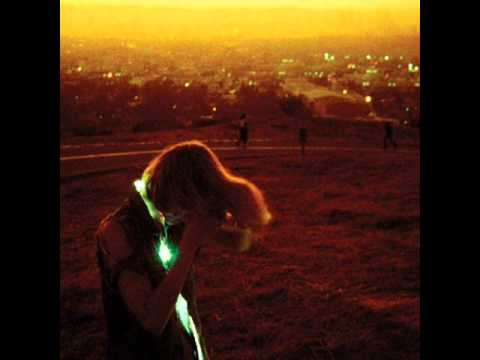
Electronic solo bedroom pop was pretty cool at the end of the 00s being pushed hard by guys like Twin Shadow. I am not sure how I got ahold of Neon Indian but this album was, in a lot of ways, the true start of my musical decade. I had not been so excited and enthusiastic about a record since I had retired from making music. It really gives you a new perspective to not feel like you’re in competition with everything and trying to learn from everything- just as a listener, I was enthralled with this entire record.
Visitors (2012) Lazerhawk
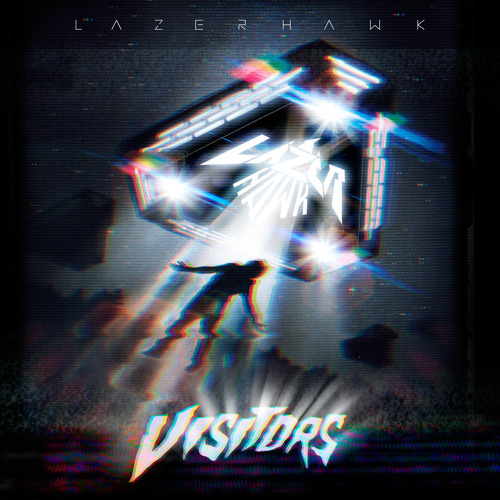
I did not get into dark retrowave until after 2013 and thus discovered Lazerhawk and this record after the fact. Visitors is, in my opinion, the best dark retrowave album ever made, more consistent and listenable than competitors such as mega drive or carpenter brut. Also. This album absolutely sticks the landing with the street-strutting powerhouse “Arrival”.
I am the Night (2012) Perturbator
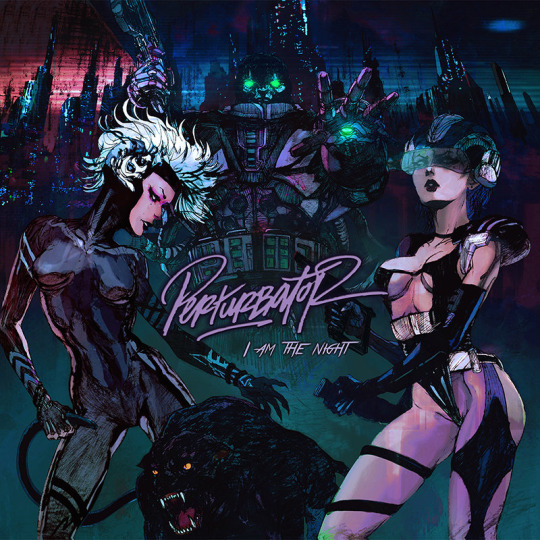
Made famous by soundtracking the indie game hit Hotline Miami (one of the best games of the decade), Perturbator carved a niche for himself with fast, brutal, high energy dark electronic music and absolutely bonkers live shows. Perturbator has a large catalog of content- I am the Night is definitely the starter kit. Starting off with a thick minor chord, a church bell, and a sample of Peter Finch’s speech from “Network” you immediately know what’s in store- dark, dystopian and undeniably French electronic dance music, complete with breathtaking beat breaks, big bass synths, and complex compositions.
Innerworld (2014) Electric Youth
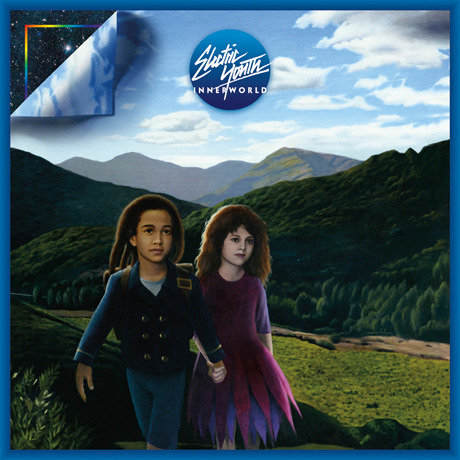
I had mentioned that Drive was a major popularizer of retrowave- and one song in particular, a collaboration between another retrowave artist named College, who created the low fi, catchy bassline for the song “A Real Hero”, and the vocals and lyrics, created by an artist called Electric Youth. Their record, 2014’s “Innerworld”, is one of the best retrowave efforts, with the second track, “Runaway”, even better than the song that made them famous. The pop chorus “Maybe we could just run away for good/cuz we’re both mis understood” soaring over thick, atmospheric synth pads will have you slapping the roof of your car, as you race through the freeways of LA at 3AM.
Atlas (2016) FM-84

Speaking of roof-slapping bangers, “Running in the Night” is probably retrowave’s most popular anthem, boasting one of my absolute favorite vocal performances of the decade. A group claiming rock and roll city San Francisco as their home base (despite being both British), FM-84’s Atlas is absolutely packed with a mixture of the atmospheric instrumental Miami Vice type music suggested by the red and purple setting sun cover as well as vocal driven pop songs such as the single mentioned above.
Hardwired (2018) Mitch Murder
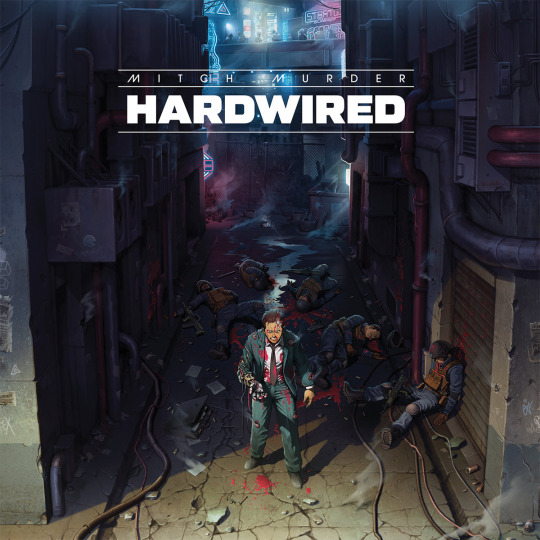
Mitch Murder is a retrowave institution, having made the soundtrack to the viral youtube movie Kung Fury, and also, I suspect, the original music used by twitch personality Dr. Disrespect. However, he almost entirely releases 3-5 song Eps, making it tough to pick out a standout. However that all changed in 2018 with the release of Hardwired, the most accomplished mitch murder release to date. Starting off with the Jan Hammer style “Altered State”, it stays on brand throughout but tells a very unified instrumental story of cyberpunk dystopian adventure. Vangelis-style synths bring in the closer track, “Revision Control”, one of Mitch Murder’s greatest tracks. Evolving through different moods, different scenes, we can imagine the “human” protagonist confronting his cyborg nemesis he has been tasked to execute.
Retrowave Album of the Decade:
Dark All Day (2018) Gunship
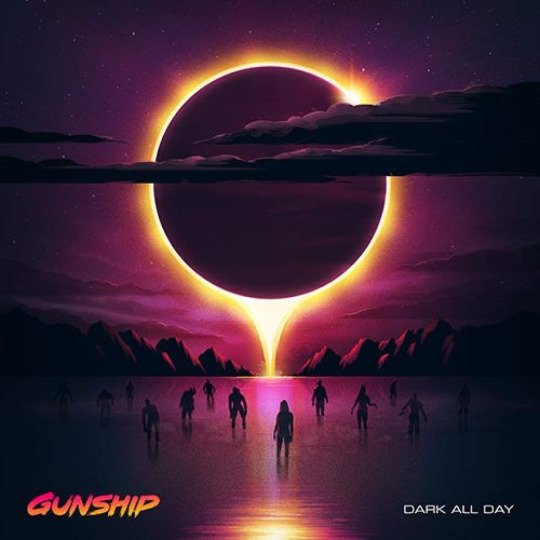
As the decade wore on, retro wave slowed down for me. I thought it might be over but- without warning, Gunship, an artist I had listened to but not been completely impressed by, released what is probably the most accomplished album in the genre. Spanning various tempos and musical themes, utilizing several guest vocalists, the scope of “Dark All Day” keeps you listening to the record again and again. This record represents an evolution in a format that was at risk of being just a fad. “Come on lost boys, lets stay alive” over a ripping saxophone lead suggests mere 80s fetishism, but there is more substance than just that. The following track, “When you Grow Up, Your Heart Dies”, takes an upbeat electro jam, and really goes for emotional impact with a series of samples of characters from pop culture saying inspirational things, my favorite being “Everything worth doing is hard” which I think is just Teddy Roosevelt. My favorite track of the record, the slow ballad “Artemis & Parzival”, begins with swooning, Vangelis-style pads and then into guest vocalist Stella Le Page’s gorgeous vocals. This track definitely belongs on anybody’s make out playlist. “Were all gonna die that’s just how it is, there’s no escaping the future, nobody gets what they want in this world, even for you and me” is one of the greatest lyrics of the decade.
Nugaze/Shoegaze-Adjacent: Shoegaze is a genre of music that features highly layered guitar effects (often run through 10 or more effects, creating a signature “vacuum cleaner” sound with a ton of distortion and white noise) and breathy vocals. Relying heavily on the depth of character of the sound, shoegaze guitar tone and production is a major creative point and almost all of these records are self-produced. Vocal themes are usually depression-inspired and lovelorn meditations, the music sounds, to most, dull and dreary, but to some, it speaks deeply to their feelings about the past and future. Shoegaze is often mixed with other guitar genres on this list, from Post Hardcore(Nothing, Title Fight), Black Metal(Deafheaven), and Thrash Metal (Astronoid).
Road Eyes (2010) Amusement Parks on Fire
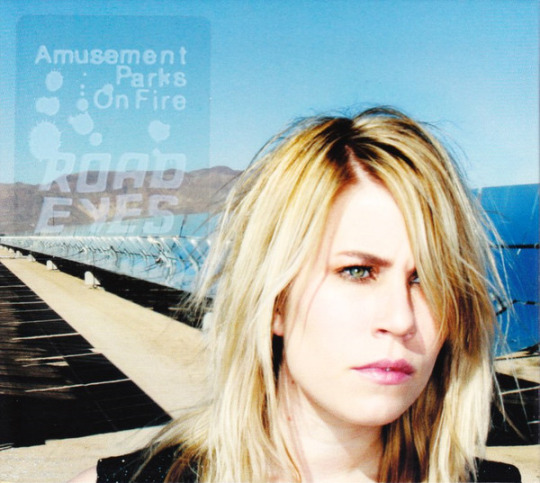
Around 2010, I was promoted at my job to a new role that would require a bunch of travel. I was not a big fan of riding on airplanes. Also around that time, my brother had moved into my apartment, then out of it, and I only had a few months left on the lease. My favorite shoegaze band of the 2000s, Amusement Parks on Fire, played a gig at 330 Ritch, a club in san Francisco. I had a fantastic time at the show, and particularly loved their new material, which made it onto a record they called Road Eyes. 2 months later I moved out of my apartment in San Francisco and never would go back to living as a single dude.
Anyways, the travelling. The opening and title track to the record came to symbolize change for me. And it also was the song I would listen to every time my plane would take off. It helped me deal with the fear that something might happen- no matter how insignificant the chance – and if it did, while that song was on, it would be okay. Indeed, this was, and I will warn you I am not qualified to treat mental illness, but this actually really made flying much easier for me and it is a ritual I continue to do to this day, whenever possible.
Pipe Dreams(2013), Sway(2014), Feels like You (2019) Whirr


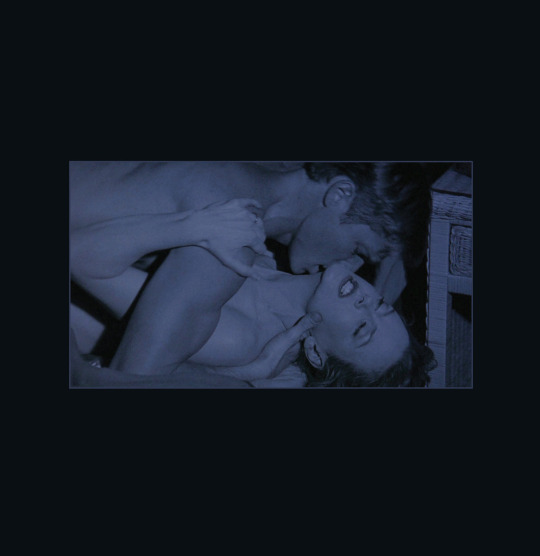
San Francisco nugaze/dronegaze band Whirr, large and complex, problematic, aggressive, are behind some of my favorite music of the decade. Their three album career reflects to me upon the primary feelings of youth: euphoria, anger, and sadness.
Pipe Dreams is a blissful set of jams, meditative, energetic uptempo and with almost totally co-ed vocals. Noisy production casts a hydrocarbon haze over the songs, raw vocal melodies reach out of the fuzz and suck you in. “Junebouvier” and “Toss” capture the euphoric and youthful energy of a summer in San Francisco: starting off with breakups May thru July, and hot hookups until September or October when people settle into relationships. Two hungry eyes emerging from straight-bangs to make eye contact with you, and hold it- the exhilaration of touching somebody new.
Sway, the band’s masterwork, starts off with a heavily muff-distorted major 7th chord suspending us until the massive drums, now a hallmark of the band’s sound, kick off the beat into the opening rocker Press. The band switches up rhythms between drums, guitars, and bass to bring rock and roll-type turnarounds and breaks that really keep you on your toes and engaged. The lead guitar is classic legato shoegaze, using delay to achieve a long, sustained scream. Compositions are key on this record- not following just simple A/B patterns there’s some thought to the structure of the songs and record. “Dry”, in particular, demonstrates some of these ideas. A/B sections, underscored with “Drown me everytime… Dry”, give way to breaks, ethereal echo guitar solos, giving a hint of the powerful ending. A 4 chord progression accented by breathtaking drum fills finaly flourishes into a screaming cymbal-laden guitar finish.
Feels like You, the bands purported final album, starts off with some quiet echo piano. The melancholy major 7 chords the band has leaned on throughout their music are laid bare as we press play on the record. Add guitar. At a little after 90 seconds the band jumps in after with a thick blanket of lonesome self-reflection and chemical depression. The bands penchant for composition remains to the end, with changes keeping you engaged as the noise soothes your heart. “Younger than You” is one of the band’s greatest tracks, starting with an almost Smashing Pumpkins/Silversun Pickups esque clean unison guitar/bass into distorted and layered noise, ending with a drum-guided, rock and roll style outro.
Guilty of Everything (2014) Nothing
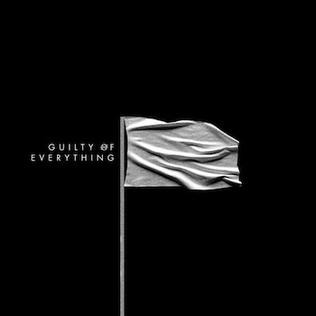
One of the things I mention in my preface to this is, for me, the 2010s were the first decade of my life that ended with me not being a musician. And it opened some doors for me, creatively, to be able to hear music and think about it purely as a listener and a person. Something others have frequently described to me, that I had never really done, was just spend an entire weekend listening to an album.
I saw Nothing on KEXP 5 years ago when Guilty of Everything was out and they were on tour. I’ve seen them twice in person since them and bought every one of their records. The weekend that I got Guilty, I was attending a close friend’s sisters wedding, and pretty much was in a hotel room drunk in overcast-as-fuck santa cruz all weekend. And you know what was being played through headphones at practically all times.
Nothing is mostly the musical project of a guy named Dominic Palermo, a punk from the Philly scene that had spent more than a year in prison for a stabbing. He isn’t much of a vocalist or guitarist, but he is a fantastic artist, writer, photographer, and visionary, and the creative force behind what is now a rotating cast of other musicians.
Guilty of Everything is definitely their best record, opening with the massive meditation Hymn to the Pillory, into the definitive single Bent Nail, a perfect marriage of hardcore punk and shoegaze elements, falling apart into the 90mph crash, into a wall, final outro chorus “If you feel like/letting go…” repeated over and over over pure drone guitars, seamlessly flowing into the romantic slow jam “Endlessly” The closing title track is one of the best closers of the decade, perfectly sticking the landing on this brilliant lyric: “My hands are up, I’m on my knees I don’t have a gun, you can search me please. I’ve given up, but you shoot me anyway, I’m guilty of everything. I’m guilty of everything”.
Hyperview (2015) Title Fight
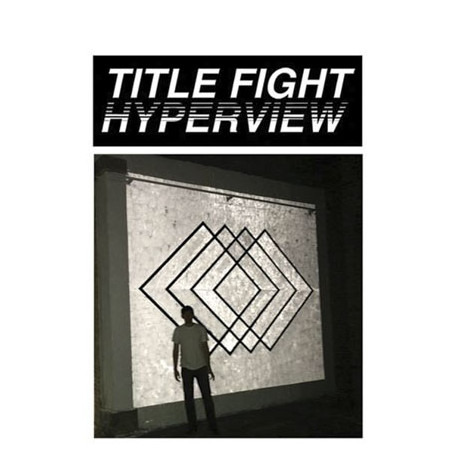
Nothing wasn’t the only Pennsylvanian post-hardcore band to bend their sound a bit shoegaze. Title Fight also sneaks onto this list with their outstanding record Hyperview from 2015. Appealing compositions and melodies combine with harmonized vocals, even some 16 beats on the hats- things we expect from post hardcore, but slowed down and smeared out a bit into the shoegaze aesthetic. My favorite track from the record, “Hypernight”, combines some screamo hype man chorus, math rock inspired guitar and bass lines, and is just all in all one of the most unique tracks to come out of the decade. “I don’t want to see things differently, its what I am taught myself to believe”.
Grandfeathered (2016) Pinkshinyultrablast
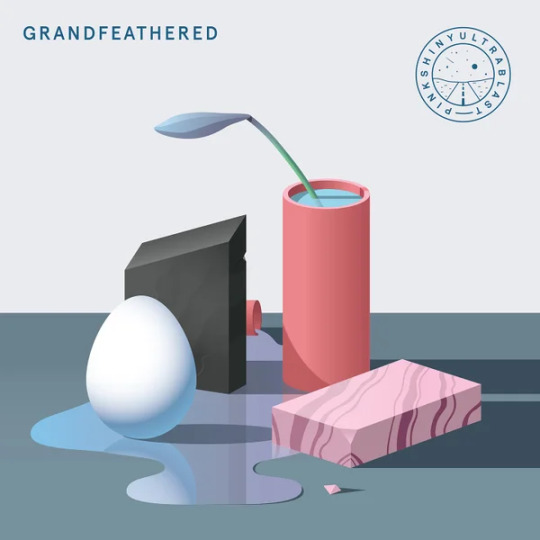
I admit that I bounced off of Russian electro-shoegazers Pinkshinyultrablast the first time I listened to them a few years ago. There was just too much going on and I didn’t really have the inclination to jump in and grab on. Operatic female vocals, noisy djenty guitar, shimmery, clean guitar, all swirl together in what is undoubtably a great record for having a tinder date IF, and I say IF, you’re willing to run a musicological acid test on them.
Whether it was listening to a bunch more music, particularly ambient music, or just changing taste now I can’t get enough of this band. They do slam from idea to idea in a song, but it’s a controlled speed- it’s not pleasant to a lot of people, but once you get yourself situated, you’ll wonder how you ever missed this band to begin with, if you’re not one of the people reading this and thinking, naw dude, I got this shit RIGHT AWAY.
The compositions on the record are, in fact, carefully considered and composed, combining noise rock with clean ambience deftly and changing up styles repeatedly throughout each song and the record. Everybody knows we can no longer control dynamics via volume in today’s world of headphone/device listening, ultramaximizing mastering, laptop speakers, etc. So Pinkshinyultrablast controls it with style. This record is definitely the more guitar-driven of the albums from this decade, with their release 2 years later being more electronic and vocal focused.
Slowdive (2017) Slowdive/My Bloody Valentine (2013) mbv
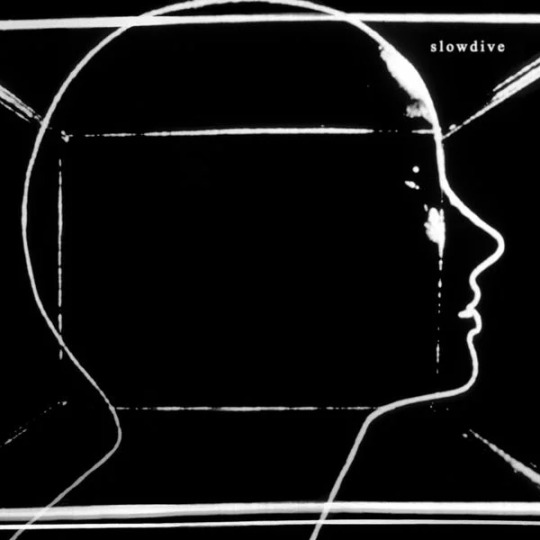
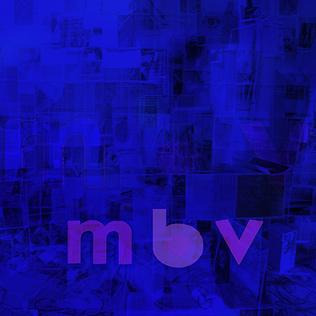
There are two bands that are credited with creating and or popularizing the Shoegaze movement during the late 80s and early 90s. Those bands are My Bloody Valentine, and Slowdive. Both of whom released albums during the 2010s. And frankly, both records are damn good for two bands that have been basically on hiatus for 20 years. Neither has really stood the test of time for me, although I listened to both exhaustively upon release.
The opening tracks of both records are absolutely mesmerizing, this slow, sexy intro is clearly the part of them that became stronger with age. The manic rock energy of their more upbeat tracks however is absent or at least forced, and I think is what keeps these from being really what I’d call strong records. Nevertheless, both albums belong on any shoegazer’s playlists both for the quality of the music as well as the nod to the progenators of the genre we love so much.
Time n Place (2018) Kero Kero Bonito

KKB was already one of the biggest indie rock groups in the world when they released this their second full-length album. Making a big move sound-wise from super squeaky clean hip hop style production to sloppy shoegaze guitars and drums, they alienated a lot of fans with Time n Place, but I don’t see how. For me, coming in for Time n Place and then going back in the catalogue to Bonito Generation, I see it as a very natural progression. As the artists become more confident and mature, it’s natural they should explore some other emotions and moods.
That said I am not the usual KKB fan. Actually at their show in San Francisco in 2018 I was probably in the top 95 percentile of being an old fart. Around me, mostly twentysomethings on the first half decade, casually doing key bumps right on the show floor, something scared old gen Xers like me, still remembering their friend’s divorced dads in cigarette boats they sold for coke in the 80s, are still too paranoid to do. The crowd definitely starting pogo jumping at the chorus to “Only Acting” a grungy, poppy metaphor between acting on stage, and being young and in love.
Right after that, “Flyaway“ is the upbeat shoegazey manic anthem that really got me sucked into the band to begin with. Combining fuzzy guitars that are more reminiscent of Japanese rock bands of the 00s than shoegaze with a crystalline clear melodic vocal line from Sarah, this is the track where I grab a handful of dirt from my dying hill, and say if you don’t like this song, you don’t like the band, the record, or my musical taste.
Miserable Miracles (2018) Pinkshinyultrablast
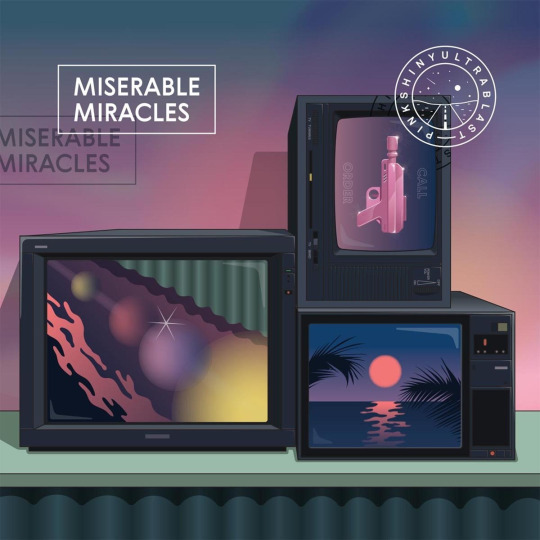
Reinventing themselves record by record, Pinkshinyultrablast keeps on the cutting edge and doesn’t make a habit of anything. Miserable Miracles is more electronics driven, lead and pad synthesizers bringing in the music with their trademark soaring, operatic vocals. Guitars are present as well, but heavily stretched with cathedral reverb and long delay. A smoother sound than Grandfeathered, but well-poised to issue a majestic, meditative prayer such as “Find your Saint”, my favorite track. Like walking into a Germanic church on Sunday, the vocals rise to the ceiling forcing you to look up at the light breaking in through stained glass synthesizers. At about 100 seconds, all of the pieces drop in together to lift you into wherever it is you are going. “I used to talk- about it” brings the heavenly outro to bear, one of the most powerful musical moments of the decade.
Astronoid (2019) Astronoid
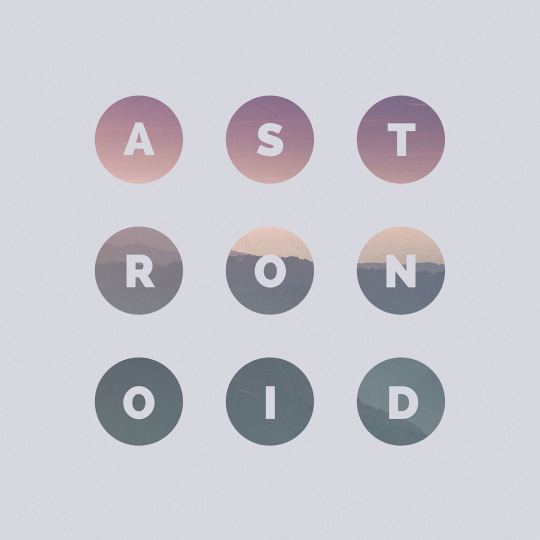
I am part of a few music groups on Facebook, and one of them mentioned this band, calling them “Dream Thrash”- a combination of dreampop and thrash metal. I’d say its more thrashgaze, with heavy effects/djenty guitar and the more whispery vocals than are a hallmark of the shoegaze genre, not the clear pop produced vocals that are the hallmark of dreampop.
That out of the way, this is possibly my favorite record of 2019. The opening track, “A New Color”, brims with energy and hopeful optimism and replaced Road Eyes as my airplane take off song. Right around 3 minutes in, when the plane is airborne and gaining climbing u to cruise, when we’re often breaking through the clouds, comes in possibly my favorite guitar solo of all time. On this record, Astronoid are unquestionably uptempo metal yet somehow at the same time being slow-changing enough to carry the emotional weight of shoegaze. The second track, “Dream in Lines”, is an aggressive, more metal-informed rocker, and the third is a power ballad that absolutely sealed the deal for me in terms of loving this album.
Other high points include the uptempo thrash jam “Breathe” and “Water”. Again infusing the metal, djenty mute strum guitar with soaring vocals and heavy backing harmonics, this record continues again and again to deliver head-banging jams that touch and heal a deep sadness in the soul. “Water” is a darker exploration, starting with a heavy chunky two-guitar & bass instrumental, virtuous breaks, and expansive echo and reverb. The band sounds like they are playing in the middle of an interstellar arena, fists human and alien in the sky.
The album sticks the landing with the penultimate track “Beyond the Scope”. This incredible song starts slowly, but upon reaching a turn, goes double-time as the melody and music climbs in pitch at 100 seconds in. This transition takes us into a greater urgency, with sustained, over-flying guitar notes keeping the harmony rich and complex.
Then, the beat drops out and a single guitar chord rings- “My hands are on my ears/They won’t stop ringing” smashes into your brain and your heart. Then again, the building section- “Feeble-minded/I can not decide/in my world, now I know/there’s no such thing as dying/so leave with a goodbye” and into another build and back to the chorus-
“My hands are on my ears/they won’t stop ringing”. I don’t think any lyric can better express the decade than that. If it were somehow possible for this album to end on this song, it would be at the head of this category.
Everything Starts to Be a Reminder (2019) Echodrone
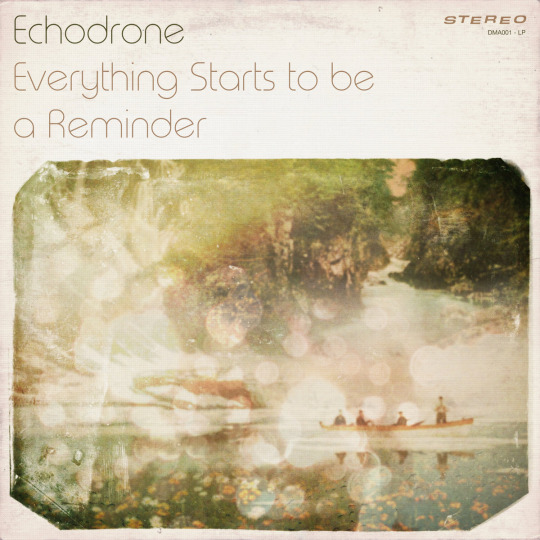
As a former musician, I have a lot of friends who are musicians. I am very brutally honest about my feelings in music and that can make it awkward to have to comment on a friend’s hard work. Echodrone’s latest record made this very easy- the record is simply amazing. Echodrone’s earlier records bounced off of me a bit, but this one has just the right mixture of drone-drenched empty space, ethereal vocals, emotional anguish and euphoria, and a strong connection to the last 10 years in my mind. The tracks are named after the four seasons, starting with Winter and ending with Autumn. Interestingly, the tracks do not really stand out as being separate in my mind, much like how you cannot easily separate a season from another season in the same year.
“Winter” explodes with an epic, cymbal-laden meditation, that continues to grow and grow and expand, then finally becomes quieter, more melodic, and less drony in the second half of the 18 ½ minute song.
“Spring” features a finger-pick echo guitar interspersed with a beautiful co-ed vocal line guiding us down a pathway of different melodic and harmonic ideas. It then enters into a several-minutes long jammy contemplation that is utterly ecstatic to me- synths layered with effects-laden bass and more echo guitar into a full stop.
The best song on the record, “Summer”, begins with a vocal sample into a more or less straight-ahead rock and roll jam. This gives way to a downtempo effects section, then at right after 4 ½ minutes, gives way to a sound I can only call Olympian in hugeness. Fuzz bass, echoing guitars, and multilayered female vocals create this trance-like atmosphere that is rarefied and deeply marked with potent and everchanging imagery at the same time, like cream on top of coffee.
The sound continues to change and becomes quiet again once again with echo guitars carrying the music through. Back to a rhythmic return at 12 ¾ minutes. A synth flute melody flies over the whispered vocals, complex drum patterns- an opine to the end of life’s summer, the bitter sweetness of being old enough to not be hurt anymore by unlikely things failing to fly.
Shoegaze Album of the Decade:
Sunbather (2013) Deafheaven

A single distorted guitar chord progression holding several notes through the chords for changing harmonics, exploding into double kick and even more guitars, into black metal screaming- this is the unmistakable beginning of Sunbather by San Francisco black metal band Deafheaven.
Due to its downtempo sections, overall distorted and layered production, and emotional scope, this album is loved not just by black metal fans but also by shoegaze fans such as myself. It is a perfect example of a successful crossover- not anticipated or forced in any way by the creators- but it just happens to work on so many different levels.
There are really only four songs on this record, the tracks in between them are much needed interludes. Something all Deafheaven songs do very well is compositioning. These tracks play out, in a way, like classical pieces, with many different sections, transitions, themes, changes, openings, closings, callbacks- it’s so incredibly dense and accomplished that you can listen to this album for weeks on end and still be surprised.
“Dream House” is the blazing opener of the record and puts on display everything we love about every song on here. To make this song the first track is insane, simply because of how over-the-top insanely powerful it is. After a brief interlude of just picked echo guitar, a single chord strum, the entire band comes back in a beat later, and this isn’t even the most emotional part of the song. That’s going to be at 7 minutes, 20 seconds in “I watched/It die!!!” screeches the vocalist as a guitar ostinado plays over the key notes that have been presented throughout the song in brutal crystal clarity. Then at 8 minutes- the vocalist and guitar break down, screaming and double picking guitar notes. It is difficult not to cry at this ending- and this is only the first song on the record.
“Sunbather” is both the title track and the album’s dark heart. Thrumming with a complex beat from the start, the other instruments are layered over this like a tangle of vines across an iron fence. Skillful use of double kick and drum fills keeps the band on target as we get to the breaks and turnarounds. The cymbals and guitars swirl creating complex patterns. Listening to this song from far away with extremely poor speakers would sound like static- similar to how Jupiter looks like a pale gold smear- turn up the volume a little, get a little closer, and you see the rich, threatening complexity of the swirling clouds of music and emotion. The song ends with a slow section about ¾ of the way through the 10 minute piece. An unforgettable echo guitar line plays sparsely over drums- invoking a Cure-like gothic sensibility. Then the band comes back in, playing the same melody and expanding upon it, a lighting bolt magnified to a thousand forks and twists going in all directions. It is the melodies at the end of Sunbather that were stuck in my head, unforgettable, after listening to this record. Unlike Dream House, this song ends on a down note, a question- the rest of the album is to give an answer, and incredibly, you will not be disappointed.
“Vertigo” is the longest song on the record at 14 ½ minutes, a blazing, minor key rocker that is meant to emotionally drag us down as far as we can go after Sunbather. The ending of the song invokes the Beatles “She’s So Heavy” before heading into “Windows” an ambient and spoken word piece featuring a drug deal gone bad- unquestionably a node to The Tenderloin, one of the more drug-laden districts in San Francisco and likely location of the band’s rehearsal studios.
Into “The Pecan Tree”, a song that has an seemingly impossible task: To somehow stick the landing of an extremely powerful and emotional record. We are looking for something coming into this track, but we are not totally sure what it is. We need something, but we can only follow the lights. The song opens up with insane double-kick guitar madness, 2 step rhythm, and then at 1:20 we see a glimpse through the storm, a hole of blue, that we can make it to, if we keep on going. Keep on going. Keep on walking. Smashing, swirling guitars and screams return, our view obstructed. Everything seems to be going at maximum at the end of this first section of the song.
At just after 3 minutes, the sonic assault finally begins to slow down, a march tempo into double kick continuous cymbals, back to march tempo, then, at 4 minutes 19 seconds, only picked echo guitar heralds us into the second section. The star of this section is a piano ostinato combined with the echo guitar, with a second guitar playing playful melodies over it. This is the starry night we can now see that the storm has cleared- this is the most optimistic and life affirming music on the record. A found audio recording of a detuned radio signals the ending of this section.
Eventually, this music fades just before four metal beats brings us to the conclusion- an octave-fingering guitar line and screeching vocal that is in my view one of the most awesome emotional turnarounds that I have ever experienced musically. The remaining outro sums up the entire record- life is big, difficult, unknowable, chaotic. Great albums stick the landing- and this ending does so, with incredible energy, on a record that did not even need it. Sunbather. One of the greatest rock records of all time and one of the very few of those albums to come out now, just about half a century after the 60s.
Post Punk Revivalists: The king of indie rock genres in the 00s, post punk was largely set down at the end of the decade with the major acts of the decade releasing milquetoast or downright laughable fare (are we human, or are we dancer?). However, post punk exploded back onto the scene in 2012 with The Money Store by Death Grips. Some returning groups from the 00s did end up releasing fantastic records, Roma 79 and Daughters being my favorites.
Cardinal Star (2014) Roma 79

I discovered north San Francisco bay area band Roma 79 through their single from the 00s, “Gold”, a sort of heavy, post-punk rocker with a few-thousand views on Youtube. I was very surprised when they reunited and recorded this followup album, which was one of my favorite records of 2014. Featuring a good amount of synth and dreampoppy guitar lines, the main standouts are the vocals and the brilliant drumming, which is a hallmark of great post-punk records of the 00s such as Fever to Tell or Turn On the Bright Lights. The strongest single on the record, “Seventeen”, features a complex drum lines, interlaced with vocals and synths. The song slowly builds up in emotional intensity and drops in layers of vaguely Phil Collins-esque drums and backing vocals, blossoming into a powerful meditative love song. “I’ll wait for it with you.” The final song on the record, is almost an answer to this track, closing the record on a strong point.
You Won’t Get What You Want (2018) Daughters
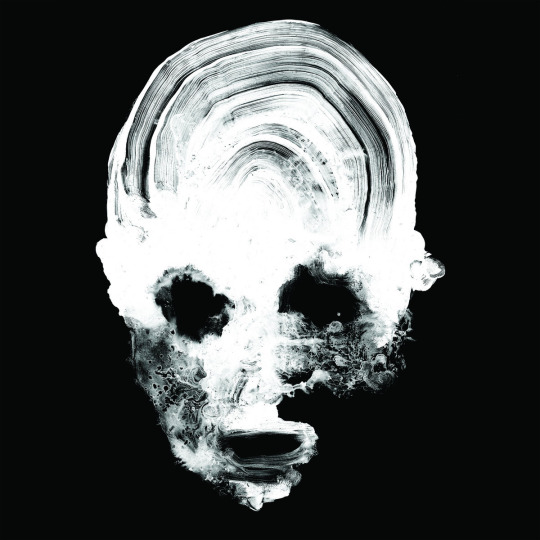
Daughters is another post-punk band that returned to release a followup nearly 10 years later with 2018’s “You Won’t Get What You Want”. Like all great post punk records, there are a number of characters in this room, and they all can be heard, each having their moments in the spotlight and their moments in the shadows.
One such character is the drums. A crushing combination of live and multitracking effects create a rhythm that provides both the constant heartbeat required by driving rock and roll based music, but also the texture, the complexity, that we seek out in the genre. Lots of tom toms used to keep the beat as opposed to cymbals, practically no hat. Invoking Killing Joke, except when they don’t want to right away, but bring it in later.
Another character is the vocals. Spoken word/sing song type delivery, where the mood and the words and more important than the melody. Lyrics invoke isolation, depression, contraction, abandonment, decline. It would almost be enough with just that, these drums and vocals- but this will also be added by another character, the music. The music seems to be generated mostly by guitar and bass, but there are clearly some synthesizer elements as well, used sparingly and to great effect. I can’t really describe the guitar tone, I would say, it shimmers, but not in an enlightening way. It’s like flashes in the dark, disorienting more than illuminating. The sound is like wood coming off a circular saw. It’s definitely this guitar sound that draws people into this record. All elements are moody, dark, aggressive, but it’s the guitar that really lays down flashes over the blackness.
“Satan in the Wait”, one of the best single tracks on the record, features an off-balance drum beat, carried by toms, and an air-raid siren like guitar sound. A throbbing, distorted bassline in time with the kick drum. At 1:30 in we are given a guitar riff that is beautiful and invoking of a banjo, lending a sensation of urban, southern gothic emotions. Horror film soundtracks come to mind, a combination of unsettling ambience and clear, unforgettable melodies. “Their Bodies are open” the chorus goes, making me think of world-ending events, a transformational death as seen in Arthur C. Clarkes Childhood’s End.
Another of my favorite tracks, “Daughter”, begins with a “bela legosi is dead” kick and snare rim drum beat, possibly electronic, along with a shimmery, surf-rock toned guitar riff. As the song proceeds, more elements are dropped in, and the drums are of particular note here, at 1:23 or so, they drop into a complex beat involving toms, cymbals, and snare. At 2:05 they drop in a clear guitar riff on top of raw noise, building to a climax with the vocal “There’s a war!” At this point, the noise drops out, just a clear guitar riff reminiscent of “Satan in the Wait”, drums coming in at 3:15 or so are particularly impactful.
The final track, “Guest House”, opens on a nearly unbearable sonic assault, the lyrics invoking somebody trapped outside of a bomb shelter during an apocalypse. Once again the gap between unbearable noise and beautiful melody is bridged, as the final dissonant chords give way to deep, harmonic, peaceful orchestra swells.
Post Punk Album of the Decade:
The Money Store (2012) Death Grips
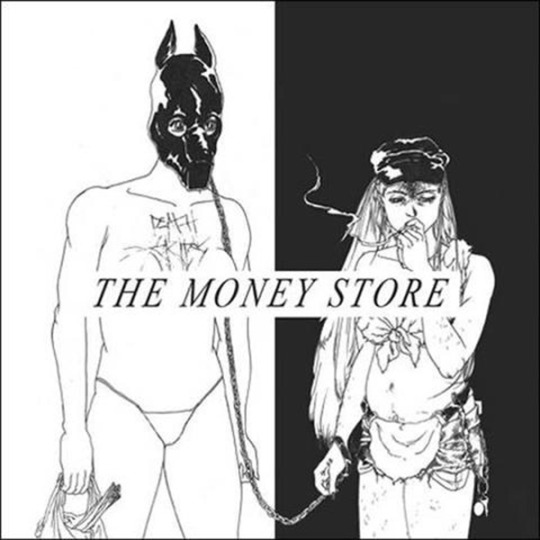
The first time somebody played “Get Got” for me, it was during a really chillwave phase in my music taste and I was completely lost, and didn’t really understand what people saw in Death Grips. I was intrigued enough though, and circled back on some tracks from Exmilitary, their prior record. The more laid back tone and empty space present in tracks such as “Culture Shock” kept me interested enough to give The Money Store another shot a year or so later.
As my interest in chillwave started to fade, and I sought more emotional substance to my music, I returned to the Money Store, and was hooked. Each track is a relentless blast of aggressive drum beats, synthesizer driven melodies, and of course the unmistakable rap vocals of MC Ride.
A strong comparison for me, is between this record, and Joy Division’s second and final record, “Closer”. Relentless beats, but never getting boring, always inventing new rhythms to cast a texture over the musical landscape. Short, fast songs, transitioning from one beat and tempo to the other, never giving you a chance to catch your breath.
The music is highly influenced by hip hop, appearing to be a chopped and cut style, with synthesizers combined with production on the vocals, adding vocals, filter sweeps, reverses, etc- so much energy and craft went into creating what is on its surface very simple music- drums, vocals, and production. Standout track “Hustle Bones” does a fantastic job of expressing what is so great about every song on this record. Everything barely makes sense, but then it all comes together in a singular moment that anybody can nod their head to.
MC Ride’s best is on display in the classic hit, “I’ve Seen Footage”. In his relentless, attacking rap style, he tells us the story of watching gore or wtf videos from reddit or 4chan (or Stile Project if you’re really old like me)- describing what he’s seen, and then underscoring that with the chorus, “I stay noided”- the character Ride creates is deeply anxious and paranoid, while at the same time being insatiable in the quest for knowing more, something I believe is nearly universal to the experience of the internet-informed human, a phenomenon that would later in the decade lead to diseases thought dead brought back by anti-vax movements, and the election of conspiracy theorist and popularizer Donald Trump as president of the united states.
And that’s the formula to each track on Money Store- working around something more or less literal, Ride’s poetry brings us into the dark state the world was only beginning to enter at the start of the decade.
Closing track “Hacker” opens with a recording of Ride, yelling, presumably at a concert “No ins and outs!!! You come out, your shit is GONE”, then into a 4-on the floor dance beat to end the record on an absolute banger. The music, carried by the beat and Ride’s systematic delivery, is left to its own devices, with glitchy, cut-off synth arpeggios, everything getting out of the way of the beat. “Having conversations with your car alarm”, “you speak with us in certain circles, you will be dethroned or detained”, and “Gaga can’t handle this shit” are some of the lyrical gems that Ride has saved for last here, closing out a post punk record that stands alongside Closer or Turn on the Bright Lights as one of the best of all time.
7 notes
·
View notes
Text
Biscuit Reviews Star Trek Discovery Season One (SPOILERS)
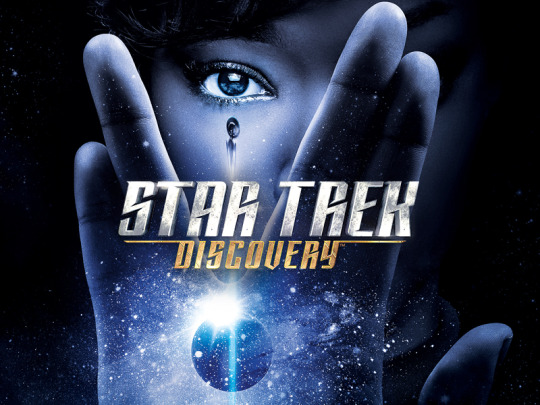
So I know I normally review games, but I figured I’d try out a different review, mostly because I have a lot to talk about with one of the new Star Trek series, Star Trek: Discovery. I recently subscribed to the CBS All Access streaming service and granted it was mostly for Picard, I figured I’d give Discovery a go in between episodes.
As for my history with Star Trek, it’s been around for pretty much my entire life. My dad is a huge fan. I remember that he used to have a huge VHS collection of TOS and TNG. My first introduction was actually through TNG and it holds a special place in my heart. I’ve also watched every series minus Enterprise (will soon be remedying that), watched every movie, was in the initial launch of Star Trek: Online and watched the fan series Star Trek Continues, where despite being “fanon”, has been regarded by Rod Rodenberry as the true continuation of TOS and has gone on record multiple times that his father, Gene Rodenberry, would consider the series canon.
So yeah, I’d say Star Trek is a pretty big deal for me.
This review is going to cover the entirety of season 1 for Discovery. I won’t break down episode by episode as the season did have a continuing storyline throughout the entire season. I will go ahead and state that I’m not going to harp on the inconsistencies of Discovery’s technology. I know season 1 takes place 10 years before TOS. In fact, I gave it a pass because when it comes to long lasting sci-fi IPs, I feel that it’s an issue that has to be forgiven. How the 1960s audience viewed the future is vastly different than how we today view the future. So with that all of the technological inconsistencies, are just going to get a pass. As far as the subject of Lore such as well established events within Trek history, that will be taken on a case by case basis and I’ll be explaining those in my review as well.
Oh, and I will also be mentioning spoilers for season 1. A lot.
I walked into Discovery with an open mind, I was actually excited for the pitch on how it followed a first officer and would be more of a personal story. Discovery follows Michael Burnham (portrayed by Sonequa Martin-Green), first officer of the USS Shenzhou, a human who was raised by Vulcans. Immediately I loved this idea as Michael Burnham, which is traditionally a masculine name, is played by a woman and a person who identifies as a woman pushing another boundary that names are just names, they got no gender.
Even her backstory on how she got adopted by Vulcans was intriguing. Her home was attacked by Klingons which resulted in the death of her parents. This not only created depth but immediately establishes that Discovery is very much Michael’s story. Then came what is what I consider the biggest blunder to Michael and perhaps her greatest weakness. The Vulcan who adopted her was Sarek, Spock’s father.
This is the first case of lore that I have a problem against. For one it’s never been mentioned that Spock had a sister, adopted or otherwise. Now you can argue that the idea of Spock having a sister is open to debate as Spock himself has teased that in the movies when he mentioned having a brother to Kirk. However, we never got any actual confirmation that it was the case. Also, we see that Sarek actually has somewhat of a close relationship with Michael which goes against Sarek’s character in that point of time in the Trek universe. Although Sarek is more open and accepting to emotions, he always still projected the outward appearance of Vulcan logic to his peers and his son. He was also always stand-offish towards Spock, yet despite that he did a lot for Spock and tried to teach him both his Vulcan and Human heritages. There’s also another issue with the Sarek/Michael relationship that I have that I will expand upon later in the review.
If you thought lore inconsistencies would be my major sticking point, my other major sticking point is the first two episodes of Discovery. These episodes cover the event that started the Federation/Klingon war in TOS, an event that would be known as The Battle of the Binary Stars. What’s my issue you might ask? This very episode actively contradicts a certain event, an event that Discovery itself established. That Michael’s home was attacked by Klingons. How does it contradict this? By having Captain Georgiou say in the same episode and to Michael that Klingons have had no known contact with the Federation for 100 years.
Now, we don’t know how old Michael herself is, but I’m assuming her tragic backstory happened 20+ years ago. Last I checked, Michael and her parents are considered Federation citizens. Having Klingons attack what is a Federation outpost, I would consider that a contact. So to have a character say that didn’t happen, when that very contact makes up Michael’s backstory was quite a head scratcher. You could argue that maybe the Federation is trying to cover that up, but if that’s the case, they’re doing a pretty terrible job by allowing one of their leading ambassadors to adopt a survivor of this attack and then accepting that survivor into Starfleet.
Aside from that bit of lazy writing, there’s also some really stupid character and narrative decisions that occured within the first two episodes. I feel that these two episodes were prisoners of the established lore so to keep in line with that, they tripped over themselves to make sure said event still happened.
You have Captain Georgiou not listening to Michael. Michael tells her how the Vulcans managed to open a dialogue with the Klingons. Despite Michael giving Captain Georgiou a proven working tactic, Gerogiou actively does the opposite thing saying, “no we can’t shoot at them, we have to talk, peace, Federation principles.” Yeah, but Federation principles are also figuring how to communicate with a species and seeing how Klingons respond with aggression and you have Michael who is citing how Vulcans established contact, nope, we gotta talk to them, not shoot them.
Now, there are a couple of sticking points that the first two episodes also show. For one, the Klingon redesign. Klingons have always had lore inconsistencies in terms of their design so I don’t see a reason to give Discovery grief on that so it gets a pass. The other point, Michael being labeled the first mutineer, with as controversial as that is among the Trek fans, I’m letting that one slide as well. I know TOS said that there has never been a mutiny on a Starfleet vessel. I know technically Spock was the first mutineer but even TOS itself has been weird about that detail. So, I feel that argument doesn’t really hold much water to count as a lore inconsistency if even the established canon likes to be wishy washy about the fact.
Anyways, it’s not until episode three that we finally get to the titular ship and meet its crew. We have Captain Gabriel Lorca, First Officer Saru, Lt. Staments, Chief Medical Officer Hugh Culber, and Cadet Tilly. There are some other regular crew members throughout the entirety of the series, but they have such little screen time that I’m not going to count them.
As far as supporting cast goes, Captain Lorca actually does an excellent job in helping establish that this Trek series is different than the usual fare. It’s more focused on war and he considers himself a Soldier more than he does an explorer. Saru, is by far the best new character introduced to this series. He’s a new race never before seen in the lore and the past he shares with Michael during the Battle of the Binary Stars creates good drama and tension in all these fronts. Staments is researching a new travel method that involves space mushrooms and his personality falls under the “cold and jerkish, but has a heart of gold” trope. He’s also the resident gay and how Discovery showed his relationship with Dr. Culber was so beautiful and amazing, that I really wish other series would take note. Then it had to do the typical “kill the gay” trope and it lost my respect.
Then there’s also… Ash Tyler. He is perhaps the most mishandled character in the entire Trek series. Honestly, he felt like someone that was just written to create problems for the sake of creating problems. I don’t mind showcasing PTSD and bringing awareness to it. But when you constantly throw the guy with PTSD at Klingons and even acknowledging it multiple times that’s not bringing awareness, that’s terrible writing and a blatant lack of understanding. Let’s not forget he’s also a result of Klingon torture, experimentation that caused his personality to be shared with a Klingon personality, brainwashing, and rape. When he recognizes something is wrong, he reaches out for help, but what does everyone do? They just keep bringing him on missions and then yell at him for fucking up. The crew keeps telling him he'll be fine, it will pass he has their support and then proceed to chastise him for not seeking help and having their back when he was having a mental episode.
The series also brought a classic TOS antagonist as well, Harry Mudd (portrayed by Rainn Wilson). I have to say if there was a way to bring a classic Trek character to help build the universe and show the relation between Discovery and TOS, having a minor antagonist from TOS was a great way to build that bridge. I’m talking about the episode where Harry Mudd attempts to steal the Discovery and he tries to do it in the most Trek way possible. Creating a timeloop with technology that is beyond our understanding, but alien enough and futuristic enough to have the audience intrigued about how the device itself works and the cast also trying to figure it out and finding a solution.
There’s also two other classic Trek trope episodes, first contact and saving an ambassador. First contact was amazing and further showcased Saru as a Starfleet officer. The saving an ambassador episode was a bit of a mess.
In the ambassador episode (which is episode 6) Sarek’s ship has been attacked by...Vulcan logic extremists. This is something that I’ll admit was a really tough pill to swallow, Vulcan logic extremists? I was against the idea at first but then I sat down and tried to think logically. I mean it’s not unheard of, as we do have Vulcans in the Maquis during the TNG and DS9 era. Having a Vulcan terrorist organization on Vulcan would make as much sense as there have been Vulcans in previous series that are in terrorist organizations. Then there’s also the Vulcans that followed and worked with Spock during his attempts to broker peace with the Romulans during the TNG era. They too were considered extremists, so much so that the Federation ordered Picard to get Spock for fear that he was defecting. So having a Vulcan logic extremist group actually isn’t as much of a leap as I initially thought.
However, it’s the event that followed the attack I have issues with. After the terrorist attack, Sarek reaches out to not Spock, but Michael. This is an issue because it’s been proven that although Sarek can be a bit callous, he will always reach out to Spock in times of trouble and need. I feel like Sarek reaching out to Michael, as he is possibly dying, is a bit of a slap to the complicated relationship showcased between Sarek/Spock throughout the years. “Sorry Spock, got to make way for your adopted sister that was messily written to have connections to us in an attempt to get the long time Trekkies to buy in the series.”
As mentioned previously, I want to make it super clear that I have no issues with Michael Burnham. I just wish that the writers treated her character with more respect to allow her to be her own character rather than have a sloppy connection to legacy characters. I feel that Michael would have stood out more if she were adopted by a Vulcan that was not Sarek, but rather some other Vulcan. I feel by having a different Vulcan adoptive parent, Michael could have had a lot more room to grow as a character. You want the connection to Spock still? Fine, make them childhood friends or something else other than adoptive brother/sister. Make them Starfleet Academy rivals, I felt anything would have been better than Sarek adopting Michael.
Then there’s the Mirror Universe, which I’ll admit the multiple episode arc that covered the Mirror Universe gave me a love/hate feelings. First, I do love that it continued and added on to the fan theory turned canon event of the USS Defiant being shifted to the Mirror Universe in the past. I love that it touched more on how a Prime Universe person, living in the Mirror Universe can take a toll on them as they do things against their morals to stay under cover. TOS only scratched the surface and with Discovery taking it further and actually having that impact Michael was truly a nice change of pace to other instances of Trek characters encountering the Mirror Universe.
But there were definitely weird moments. Again, continuing to put Ash Tyler in situations that trigger his PTSD or his dormant Klingon personality, Captain Lorca actually being from the Mirror Universe. Now I’ll admit I wasn’t a fan at first, but the way he left the Mirror Universe and returned was such a Trek way of going back and forth, I can’t help but actually admire it.
Of course we run into counterparts of other characters as well. For example, we find out that the Mirror Universe version of Captain Georgiou is actually the Emperor of the Terran Empire. It was such a beautiful build up and made so many changes to Michael and bringing the Emperor to the Prime Universe could and does lead to some great dilemmas. However, there is one very tiny thing that I feel negates all of that and something that plagued Discovery in its first two episodes. Being a prisoner to established canon. When Discovery makes their way back to the Prime Universe they are ordered to never reveal the discovery of the Mirror Universe to anyone, because you know, Kirk hadn’t found it yet. So how does Discovery explain this? The Klingons can’t know about alternate universes and that it’s possible to travel to them so they are ordered to never reveal the possibility of alternate universes.
Anyways the Federation is on the verge of losing the war and desperate means call for desperate measures, that being genocide. Now it’s the not first time the Federation has threatened to commit genocide, they’ve threatened to do that in the established canon a few times as well. TNG did it, DS9 did it, Voyager did it, and from what I can tell, Enterprise did it too. So being in the corner that they were in is not uncharacteristic of the Federation, especially with how desperate they were to turn the war around. It also establishes Emperor Georgiou as a recurring antagonist to appear in future episodes.
After turning the war around, the Federation and Klingons agree to end hostilities, the Klingons are united as one empire and glorious speeches all around then off to Discovery’s next mission: Escort Sarek to Vulcan and pick up its new Captain. However, during the journey, Discovery picks up a distress signal from none other than the U.S.S. Enterprise and ends with the classic ending theme from TOS, which I’ll admit really hit hard and brought many happy feelings.
Discovery does have a lot of potential. However, I feel the writers are trying too hard to keep within established lore. The attempts to also sell Michael as the sister of Spock holds her back so much that it weighs her down unnecessarily. A lot of issues I have with Discovery is with its writing. It has all the ingredients to be a great series, but it was greatly mishandled. I feel that if Discovery was either not a prequel series, or a prequel series that didn’t try to play coy with established events the first season would have been great. With as big as a universe there is to play with, they could have had the potential to truly explore new worlds and ideas and it wasn’t seized upon. Hell, despite a rough beginning, it had a great idea with introducing the theme of war it established in the beginning and how it affects someone on a personal level.
However, despite the good, it was mishandled in so many ways and did these new characters more of a disservice than anything.
Star Trek Discovery receives a 2 out of 5
#Star Trek Discovery#Discovery#Disco#Biscuit Reviews#Series review#Star Trek#CBS#CBS All Access#Star Trek: Picard#Michael Burnham
5 notes
·
View notes
Text
I just watched Baymax Returns and ooh goosh do I have thoughts...
Older followers may remember my BH6 phase back in 2014, and those with a sharp wit may even recall me vying for a TV series, like, the week after it came out. So the fact that this finally exists and has been put forth into the media sphere makes me happier than words can describe.
But first, I would kindly like to ask people to leave their comments about the blandness of the series at the door. As it’s been shown from many, many animated pilots in the past, the show is just starting to warm up. Look at Bob’s Burgers, for example. Give it time to grow; don’t snap judge it so quickly. It’s only just begun, after all – and with the Kim Possible creators behind it, I feel confident about it.
I do unfortunately have to agree about the animation style being a little stilted, though I don’t necessarily think the look of the show is a bad thing! I love the influences the animation team drew upon to develop the visual look. I love the overall anime-esque style they pulled out for the character designs and the world’s feel. I love how they were able to translate the look and feel of the super suits into this smaller scale. I love the action scenes. I love the evil Baymax army. AND I LOVE THAT THEY GOT THE ORIGINAL VOICE CAST BACK HOOOMYGOSH. But the anime-esqueness does come with a lack of variety in facial expressions, though again, I have faith.
As far as the story does go, I looove all of the callbacks to the movie – and they weren’t all obvious, either! Granted I had watched the movie the night prior to watching the pilot, but there were things I picked up on right away. Specifically pointing out how Tadashi wanting to help a lot of people. Bringing up Tadashi’s last words to the dean. “It’s really not.” Even the subtle comment about Hiro switching Baymax’s charging system, a SUPER minor detail brought up in the beginning of the movie like look at how closely these writers were paying attention!! Clearly they did their homework in making this series, and as a transitional piece to get the gaps filled in between the end of the movie, I think it works fabulously. Flawlessly, even; a lot is left ambiguous in large time skips and the foreshadowing for the rest of the season is just too cool.
Granville could have been less of a hard ass though, or at least... more subtle about it, I think. And the pacing did take a bit to kick in. But again, I’m chalking this all up to pilot syndrome – and her last exchange with Hiro was really touching. Another thing I’m sort of worried about carrying on post-pilot is Fred’s overbearing, overeager nature and Wasabi’s neuroticism. It’s still way early in the game to worry about or even tell of their flanderization, but I can already sort of see the potential for disaster on a few sides, and I can only hope it will be avoided. I would say between the movie and the pilot, about 98% of interactions and general depictions translated as “in-character” behavior for me. Fred did feel a little out of line sometimes, but at least it was balanced by the in-universe group getting annoyed with him as well.
And screw anyone who says this show isn’t funny!! There were quite a few bits that had me laughing out loud, for sure.
I also love that they’re already starting to worldbuild with district names and fast food chains and transportation!! That’s so cool to me. Noodleburger sounds adorable and delicious. And I looove that they sort of kind of gave Aunt Cass more to do even in the background (and that they got Maya Ruduolph back for her!) And I love love looove the display of all of the tech at the college... from the projects on the Quad to those sick liquid sucking robots in the cafeteria. Again, it really shows a cool level of attention to detail on the part of the staff and animators. I can’t wait to see how this is pushed further.
(Warning for more in-depth death talk below. I wouldn’t usually think to do this, especially given that this hinges on a major plot point in the movie. But I’ll be talking more so about real life death, and something happened a few days ago that I’m a little raw over still, so I don’t want to drop this on anyone out of the blue)
On one final, more personal note (and this is super morbid of me so be warned), it seems like Tadashi is staying gone for good and I’m actually really glad they’re going down that route!? The only reason I bring this up is because a LOT of people seem to think they’re going to bring his character from the comics into the mix or create a new one for him, but I really love the idea of him being on the team THROUGH Baymax.
Part of the reason I connect so deeply with BH6 to begin with is because it came out in the wake of me still trying to move on from the death of my childhood friend, whose life was cut short in a drunk driving accident almost a year prior. Hiro’s struggle to accept that even though he died, Tadashi is still with him through what he’s left behind, hit home really hard. I’m glad it’s already being addressed in the show and used to the storytellers’ advantage.
So tl;dr: I’m really looking forward to the direction this series is headed from here on out. I don’t know what it is about these super nerds that keeps drawing me back to them, but I love them and can’t wait to see what heroic misadventures they get into.
38 notes
·
View notes
Text
X-Men - The Movie
I’ve been wanting to rewatch the XMen films for a while, and I’ve been particularly in the mood for it lately. So, I think I’m gonna go through all nine (ten - do I count Deadpool?) films over the next few weeks. I’ll tag: xmen, as usual since I figure a majority of you don’t care.
//
I first saw X-Men when I was a teenager in high school, and there weren’t really superhero movies unless you count Superman (which was really outdated at that point) and Batman (most of which were....not that great). So, this was the first big superhero movie that /worked/ - and kind of spawned what superhero movies were to become. And the film rejuvenated a near failing x-line and Marvel. I loved the movie back then, having only watched the cartoon before hand, I had no knowledge of the comics. And it really got me into the X-Men - more than just being a fan of the show when I was a kid. I picked up a comic book for the first time when I was 16.
But now here we are, nearly twenty years later (damn), me having read a ton of comics, and have had the entire weight of the XMen franchise and MCU behind me and, well, hm.... It’s not a bad movie. But I don’t think it’s a particularly great movie either. I think the biggest problem is that it hasn’t aged well. It’s very much a product of its time, and it shows.
Pros:
The message X-Men has always stood there is very much there. Mutants are feared and hated and it’s allegorical for any minority group ever. It’s still a resonate theme for even today.
Patrick Stewart and Ian McKellen are perfect in their roles Professor Xavier and Magneto respectively. The highlights of the film are when these two are in a scene together, a few of which are sprinkled throughout the film. (My favorite being Xavier and Magneto’s standoff with the police, the one time the movie really showcased the two’s powers against each other.) You would think that it might have made more sense to start the franchise based on these two characters alone.... oh wait....
Also - I kind of love that Xavier, even in the movie-verse, is fucking with everyone’s head.
Hugh Jackman’s Wolverine. It’s funny because I think he actually grows more into the part and more comic-book Wolverine as the franchise goes on, but it’s mostly solid here.
Rogue’s aesthetic. I don’t mind Anna Paquin’s performance of a young Rogue, even if I miss my sassy grown up Rogue of the comics. But she definitely looked like Rogue. And that was pretty cool.
Wolverine and Rogue’s friendship. Man, I wish they had built more on that. There could be a whole movie just with the two of them - and that would have been fun.
Famke Janssen as Jean Grey. She does the role really well, even if I wish that even Jean was more developed. She also really looks the part, man...
The kid who played Iceman works! I’m sorry there was so little of him, but he’s good in the role.
I like the Rogue/Iceman friendship. I don’t necessarily by the romantic angle set up in other films (Iceman is gay and Rogue has better chemistry with other people) but they do have a comic friendship that’s a pretty cool dynamic. And I think that plays out well on screen here.
The little Easter eggs for the comic fans. I get them all now. Not sure what that says about me but -- yay!!��
There are some really good one-liners.
The few times the X-Men actually worked as a team was really fun.
The school set - damn. That is so the school.
Cons:
One of the things I think really helped MCU is that they didn’t start with The Avengers. They started with Iron Man and Captain America and Thor’s individual stories and built on them until they led up to The Avengers. While I realize this was never going to work with X-Men (I mean, X-Men is a team book and people probably wouldn’t have wanted solo series first), I think one draw back to this film is that it can’t properly give the characters the fleshing out they deserve because it’s only two hours. And the pantheon of characters who deserve to be focus would never be able to fit in a twenty hour film let alone two. (I understand the central focus of Wolverine, but it makes me miss development of nearly every other character.)
Case in point - Cyclops and Storm are incredible characters and they’re all but lifeless here. At least James Marsden gets the feel of Cyclops, even if he’s barely developed. Halle Berry’s Storm though - well - I think it’s pretty universally panned.
(Storm is so amazing and deserves so much more.)
This film completely lacks any energy and feels incredibly slow paced. I get I’m now spoiled by the high-adrenaline of the MCU, but, idk, this movie really drags. The characters have such interesting powers - it’s a shame we didn’t really get them more in-depth.
The special effects are incredibly dated, to the point where some are really cringe-worthy. Also, Wolverine’s claws.... eesh...
The brotherhood of (evil) mutants feels lacking. I understand why they went with who they went with (Sabretooth, Mystique, Toad) but none of them are developed enough for me to care.
Which brings me to - I feel like there’s no real tension in the film? The plot is classic in that it’s Xavier vs Magneto’s dueling ideologies about mutants and humans coexisting. But I guess I don’t really feel the threat? Maybe because so many of these characters have such great inner conflicts that that seems like the more interesting avenue to go down.
The Jean/Wolverine hint of romance. Wolverine isn’t a flirty character, and I don’t really buy it in any incarnation.
Most of Rogue’s actions don’t make any sense. Why does she run to Canada? Because she needs to be there to meet Wolverine. Why does she sneak into Wolverine’s room? Because Wolverine needs to stab her and she can steal his power. Why does Rogue believe fake Bobby? Because she has to get on that train. I mean - Rogue is a runner by nature, but it feels like 90% of her actions are plot driven and not necessarily logical.
Other Things:
Doctor Jean Grey. Ha. I had forgotten they made her a Dr. It’s fine - mean more power to women with power. Just -- Jean, no. And it made me miss Beast.
When Wolverine is wondering around the school near the beginning, I kept waiting for Hugh Jackman to break out into song.
The movie is aesthetically dark - as I believe it was trying to move away from the brightly colored spandex of the comics. I get why they went there, so not really a con. But I do miss the bright colors.
Not entirely sure why they needed to explain the coloring of Rogue’s hair. But it’s an interesting little addition. She doesn’t feel like Rogue without the white streak though.
Why is Mystique completely naked? In the comics she wheres a white, flowy dress. She needs her white, flowy dress to be Mystique. Idk...
Final thoughts: I’m giving it a 6/10. The movie feels like a basic introduction to so many other interesting things. While not bad, in general, doesn’t hold up well after all this time. And with the exception of Wolverine, the characters just feel so flat.
5 notes
·
View notes
Photo
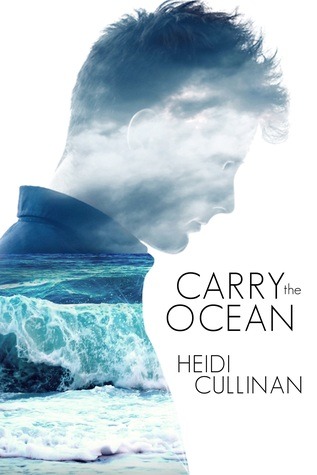
Book review: Carry the Ocean by Heidi Cullinan
Contemporary Fiction, LGBT Fiction, Young Adult Fiction, New Adult Fiction
https://www.amazon.com/Carry-Ocean-Roosevelt-Heidi-Cullinan/dp/1945116986/ref=sr_1_1?ie=UTF8&qid=1496721454&sr=8-1&keywords=carry+the+ocean
--- My rating ---
4 / 5 stars
--- Synopsis ---
“High school graduate Jeremey Samson is looking forward to burying his head under the covers and sleeping until it's time to leave for college. Then a tornado named Emmet Washington enters his life. The young man with a double major in math and computer science is handsome, forward, wicked smart, interested in dating Jeremey--and he has autism.But Jeremey doesn't judge him for that. He's too busy judging himself, as are his parents, who don't believe in things like clinical depression. When Jeremey's untreated illness reaches a critical breaking point, Emmet is the white knight who rescues him and brings him along as a roommate to The Roosevelt, a quirky new assisted living facility.As Jeremey and Emmet find their feet at The Roosevelt, they begin to believe they can be loved for the men they are beyond their disabilities. But before they can trust enough to fall head over heels, they must trust their own convictions that friendship is a healing force and love can overcome any obstacle.”
Book one of the Roosevelt series
--- Review ---
I gave Carry the Ocean 4 stars because I really enjoyed it (I debated maybe 4.5 stars). I would recommend it to anyone interested in a character-driven, contemporary, and emotional narrative. I would also recommend it to anyone interested in LGBT fiction or slash fiction. It’s suited for age 17+.
Carry the Ocean is told in first person from two viewpoints, Jeremey and Emmet, in alternating chapters. Both protagonists are teenage boys, and each voice is beautiful with so much depth. Emmet has Autism Spectrum Disorder, and his chapters were my favorite, I loved to read about what life is like with ASD. The character has such a unique and fascinating perspective of life and of himself. His mechanisms for coping with ASD seemed to be described well. His chapters were uplifting and beautifully honest, and his relationship with his parents was lovely to read.
Jeremey has Major Depressive Disorder and Clinical Anxiety. His chapters were darker but equally honest and fascinating. It was sometimes difficult to read about such crippling anxiety, but the interaction between him and Emmet always saved the day. They meet within the first few pages, and the relationship they develop is very real, and based on respect and honesty. The two characters understand one another, work together, never judge each other, and lift each other up. Throughout the book, the boys learn about each other and what the other needs.
The insightful inner voice of the boys was the best part of the book. Each is different in tone, but both are very honest without being over-dramatic. The book is easy to read, and the major themes are presented well, themes of friendship, love, and acceptance. This book is for anyone who has ever felt like an outcast, or anyone struggling with mental illness. The major message, that there is no normal, that normal is an illusion, is presented very well. Simply, this book is about two boys trying to deal with society’s expectations and parental expectations, and learning that it’s okay to be different. It’s also refreshing to read a novel with an LGBT relationship where the relationship is not the conflict.
I hesitate to call the book Young Adult because of the graphic sex, but of course sex is part of teenage life, and it’s presented very maturely. Perhaps New Adult is a better genre to place this book in. The sex scenes are told during Emmet chapters, which is a unique perspective and made the scenes intriguing and quite original. I love how the boys talk about sex as well, very frank, and always open with their needs.
My minor complaints are that the alternating perspective can be hard to keep track of. I tended to begin a chapter without remembering the perspective had shifted (even though each chapter is labeled). Also, the character of Jeremey’s mother is very overdone. She’s incredibly ableist, and seems to have very little compassion for her own son. Another minor complaint I had is I tend to enjoy somewhat poetic prose, a little more flowery, but the writing was very matter-of-fact. [cont’d]
---- Plot-review ---- [SPOILERS]
The book begins with Emmet describing what it’s like to be Emmet, what it’s like to have Autism Spectrum Disorder. Emmet is high-functioning and whip-smart, and the first chapter of the book is a bit of an info-dump about the ways he is “normal” and the ways he is special. He decides he wants to ask out his neighbor, Jeremey, but he has to to research first about how to ask someone out and how to behave so Jeremey won’t be confused or turned off by Emmet’s lack of standard social decorum.
“... to learn and memorize the etiquette, to find the right words that would show me to Jeremey, not my autism. It took a long time and a lot of work, but I did it.”
As a reader I connected immediately with Emmet’s voice. I’d say it’s one of the most well developed perspectives/voices I’ve read in fiction in years. It’s an amazing insight into life with ASD.
Chapter two is from Jeremy’s perspective, it picks up where chapter one leaves off. The reader learns about Jeremey’s anxiety and depression. At first, he is confused by Emmet and has a panic attack, but Emmet is exactly what Jeremy needs in the moment and he helps calm Jeremey’s nerves.
“For the first time since my meltdown, I wasn’t thinking about how to make the world stop, how to escape the failure that was my life. I thought about Emmet Washington...”
Throughout the next few chapters, Emmet and Jeremey get to know one another. They hit it off immediately. There’s no drama with how they feel about one another, which is frankly refreshing. Jeremey learns about Emmet’s ASD, and Emmet is happy to learn about what its like to live with Major Depressive Disorder and Clinical Anxiety. Their first kiss comes soon after, but Jeremey’s mother walks in on them and is not happy with what she sees.
This is where the conflict is introduced. Jeremey’s mother is, well, a bitch. She’s homophobic and ableist, and neither does she understand or seem to care about her son’s panic attacks and depression. In my humble opinion, this character is way overdone. She yells at her son in Target for having a panic attack, calls Emmet the R-word, and cares only about her son being “normal”.
After this, Jeremey and Emmet are not allowed to see one another, though they communicate through text message. With the oppression of his mother and without Emmet to comfort him, Jeremey attempts suicide.
Emmet and his mother, a doctor, call 911 and Jeremey’s life is saved. He has to spend a few weeks on the psychiatric floor of a hospital, and he sees a therapist, Dr. North, a therapist who has been also seeing Emmet.
“I visited him on the third day, when Dr. North said Jeremey could have visitors again. He said Jeremey had been good and worked hard on his therapy and deserved a reward, and I was the reward he wanted. That made me happy. I’ve never been a reward before.”
Through therapy sessions, Jeremey’s character is really fleshed out and the reader learns about his relationship with his parents. At this point as a reader I felt very invested in Jeremey’s wellbeing, and Dr. North was a godsend and a breath of fresh air for both Jeremey and Emmet.
“The most difficult part about being in the hospital wasn’t the meds, or the loss of freedom, or the scariness of what would happen when I got out. It was my mom.”
The boys decide to live in an assisted living facility together when Jeremey leaves the hospital, and after convincing their parents they can care for themselves, Dr. North tells them he thinks it could be a great idea, that it would be best for Jeremey not to go back home with his parents.
“Also, if we lived in the same apartment, we could have sex. The drugs dulled the yearning a little bit, but only when Emmet wasn’t in the room. When he was with me, like right now, talking and planning and being so bright, all I wanted to do was kiss him and touch him.”
Jeremey is first moved to a group home. These chapters give another great dose of insight about how mentally ill people are treated in society and what group homes can be like and why.
Finally, the boys move into the assisted living facility, The Roosevelt. It takes time for them to adjust to living together and for Jeremey to get used to Emmet’s rules. Meanwhile, Jeremey’s social anxiety means he cannot go shopping or be in loud, unpredictable environments. The social workers who live at The Roosevelt help them with the adjustment.
“In our apartment, Jeremey and I had a good pattern. The notes helped us with organization, and our Saturday morning meetings with Sally and Tammy helped us learn how to make sure we didn’t have any problems we needed to work out.”
Jeremey struggles to find a job. He decides he’d like to work for one of the residents at The Roosevelt, one who Emmet hates, and this causes a temporary rift. Emmet learns to better communicate with Jeremey about what is bothering him and why, and Jeremey slowly learns to overcome his anxiety and how to get out from under the shadow of his parents.
Without giving away the ending, the book has a quiet ending, but the story is wrapped up beautifully, and though it gets heavy at times, the book is overall uplifting, well-written, eye-opening, and reminds the reader that the differences between us are not really so big after all.
My favorite part of Carry the Ocean is the voice. The Emmet chapters are quite different from the Jeremey chapters in voice and tone. Emmet is matter-of-fact, honest, and has trouble reading emotions. Jeremey is quiet, anxious, and he is very easily bothered by the emotions of everyone around, which is why he has trouble in public places. It’s alluded to, and once stated outright, that Jeremey is the less “together” one, while Emmet is his white-knight who does not judge him and is able to be exactly what Jeremey needs. They’re a great pairing, I love a book where the relationship starts early on, and individually they’re amazing characters that I will remember for years.
---- Warnings---- [SPOILERS]
Graphic sex
Non-graphic suicide attempt
(feel free to message me if you’d like to know more detail about the warnings before reading the book)
#carry the ocean#the roosevelt series#book review#carry the ocean book review#ya fiction#lgbt fiction#lgbt literature#young adult fiction#new adult fiction#contemporary fiction#books
5 notes
·
View notes